Charlottenburg: A Pic Spam
Feb. 19th, 2024 07:27 pmCharlottenburg, originally built for Sophie Charlotte, the first Queen in (!) Prussia, grandmother of our antihero and usually credited with bringing the intellectual and musical streak into the family, became one of the most splendid Berlin palaces. From Fritz' ascension in 1740 to ca. 1748, when Sanssouci was finished, it also served as one of his main residences, and was definitely where any grand festivities took place. Later Hohenzollerns like FW2 liked it a lot as well. Courtesy of the Royal Air Force, it burned in 1943, so the restoration took quite a while, but the result is very, very impressive. Both the Old Palace in its baroque splendour and the New Palace in its more airy Rokoko playfulness.
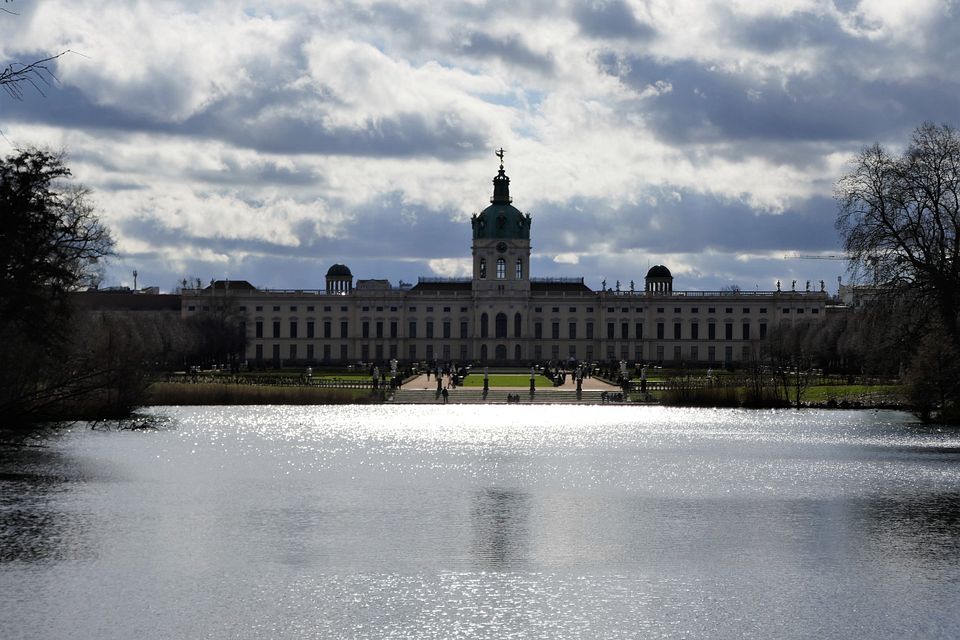
This is the Old Palace, the Altes Schloss, the original core building.
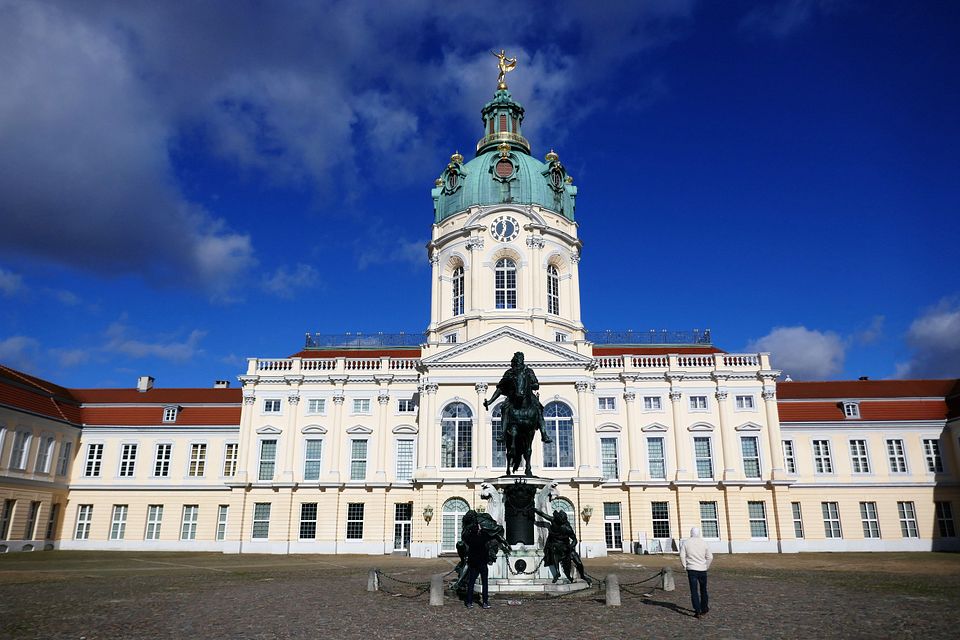
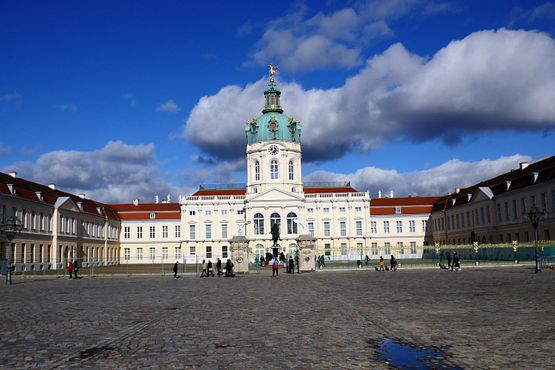
The New Palace, where Fritz and the post Fritz Hohenzollern resided.
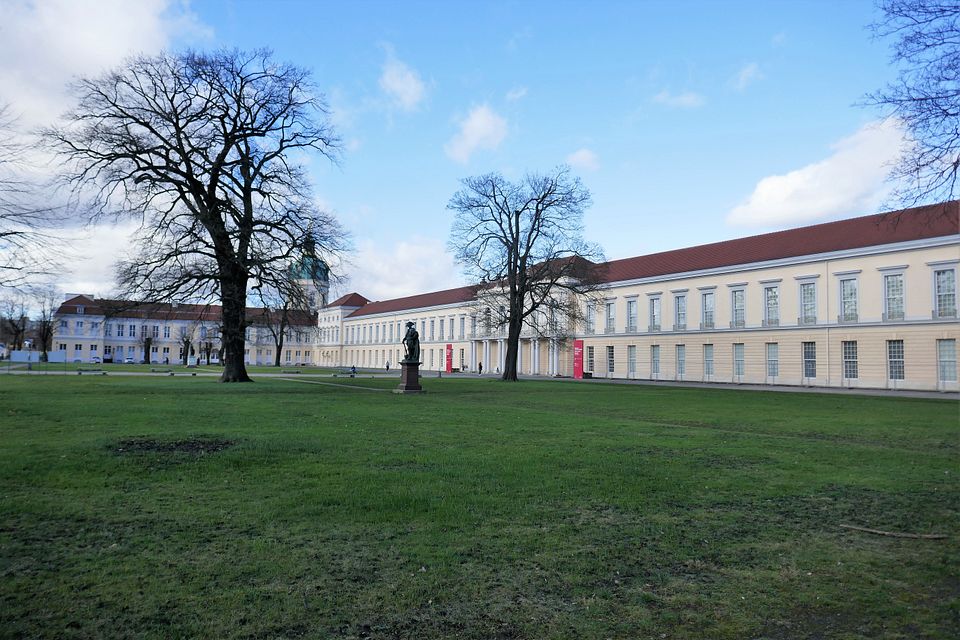
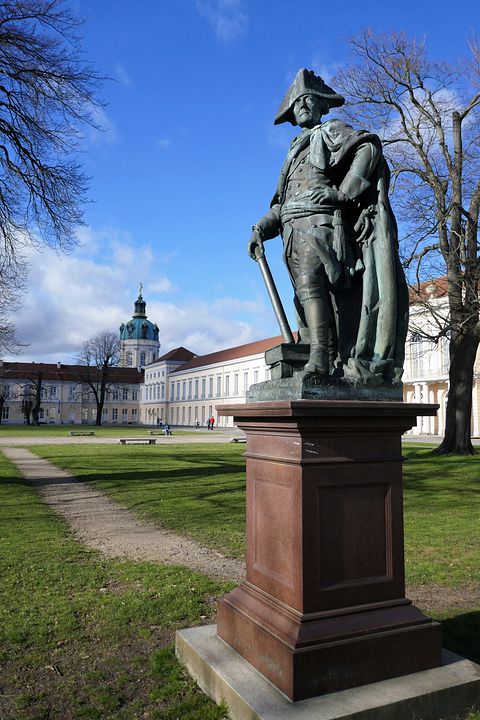
The roof where I imagine young Sophie (future Catherine the Great) and Heinrich playing hide and seek:
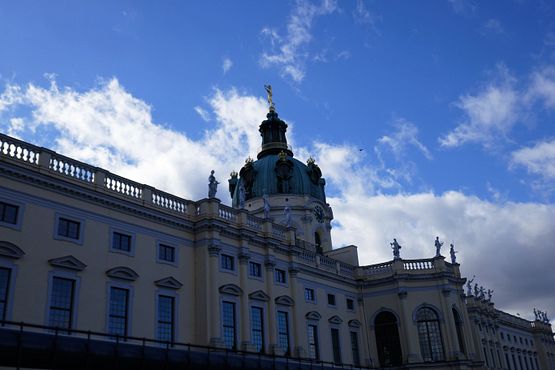
The park, through which as F1 once wrote touchingly to his mother-in-law, he still wanders looking for his beautiful (dead) queen, her daughter:
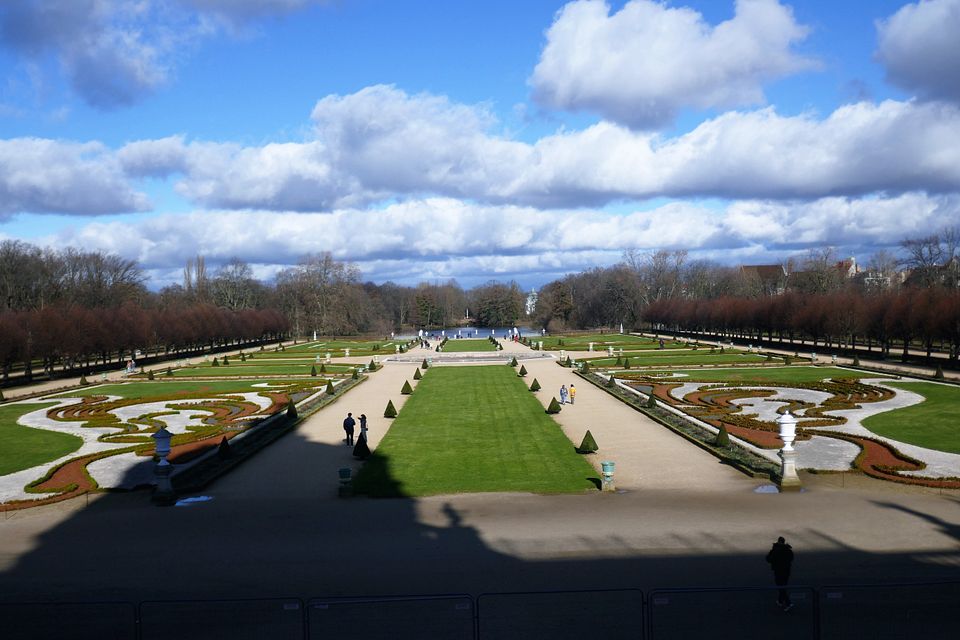
It also has the occasional mini palace building, like Belvedere.
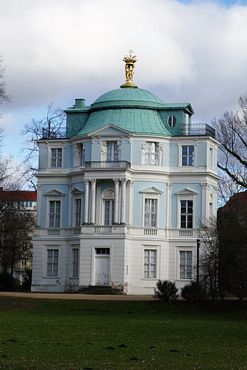
But that's closed in winter. So let us enter the old palace. Where F1 wants you to know he so is a King, too, and anthing Louis XIV can do... welll, you get the idea.
This "parade bedroom" was one of the last rooms created in F1's life time, for his third wife, the Mecklenburg princess who went insane and scared him to death.
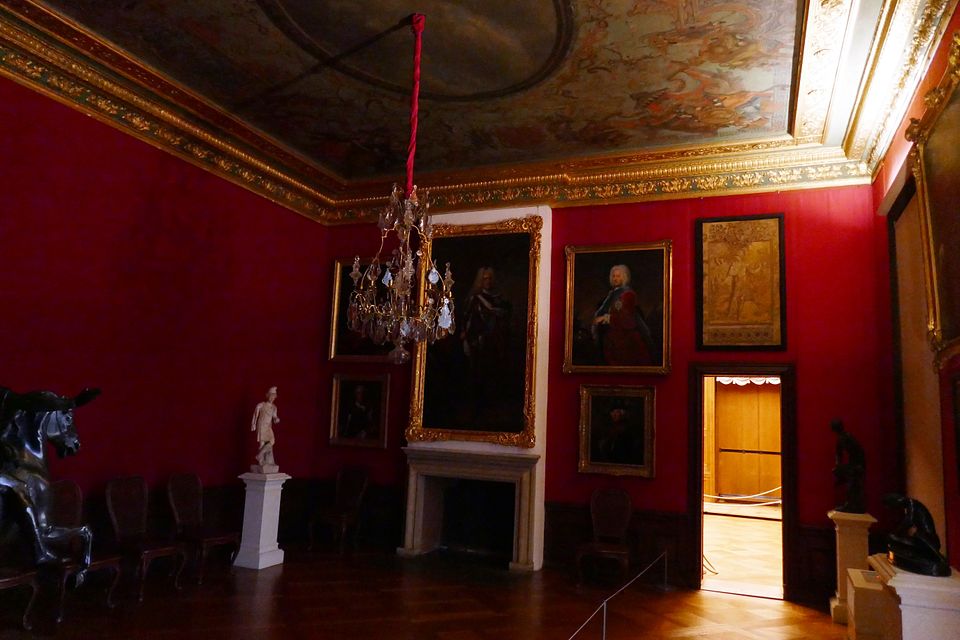
The darkness is because this room actually made it through the centuries and WWII intact, so they can't put too much light on the decor.
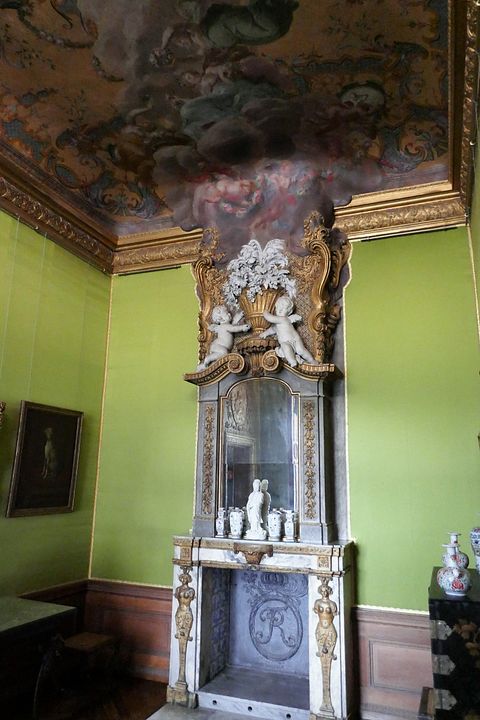
A lot of the paintings on the ceilings are preserved, which you'll later see is not the case in the New Palace.
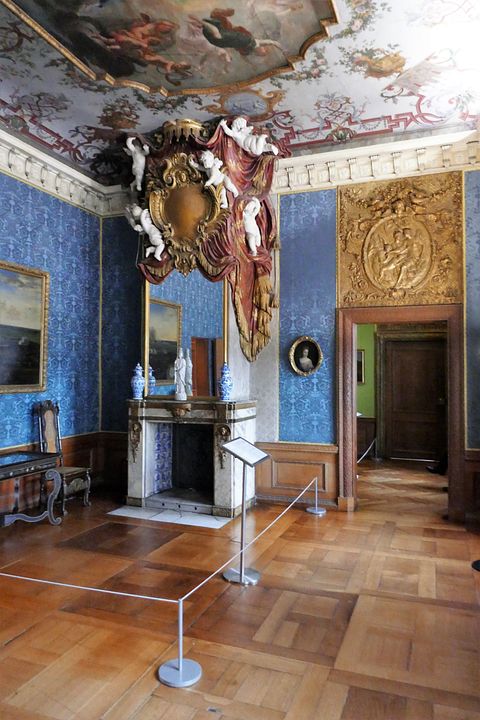
The Green Antechambre. All the followoing rooms were created for Sophie Charlotte, the Hannover princess who briefly transformed Berlin to an "Athens on the Spree".
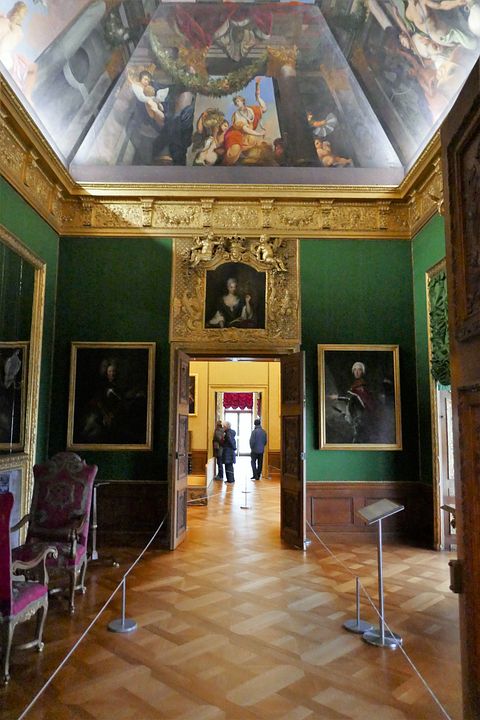
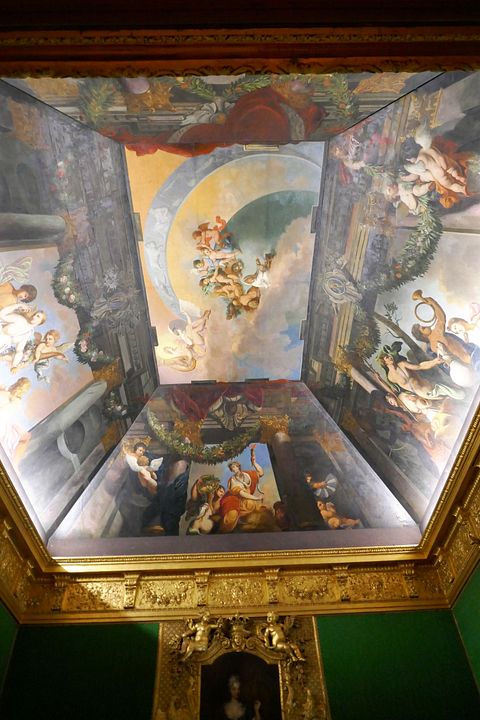

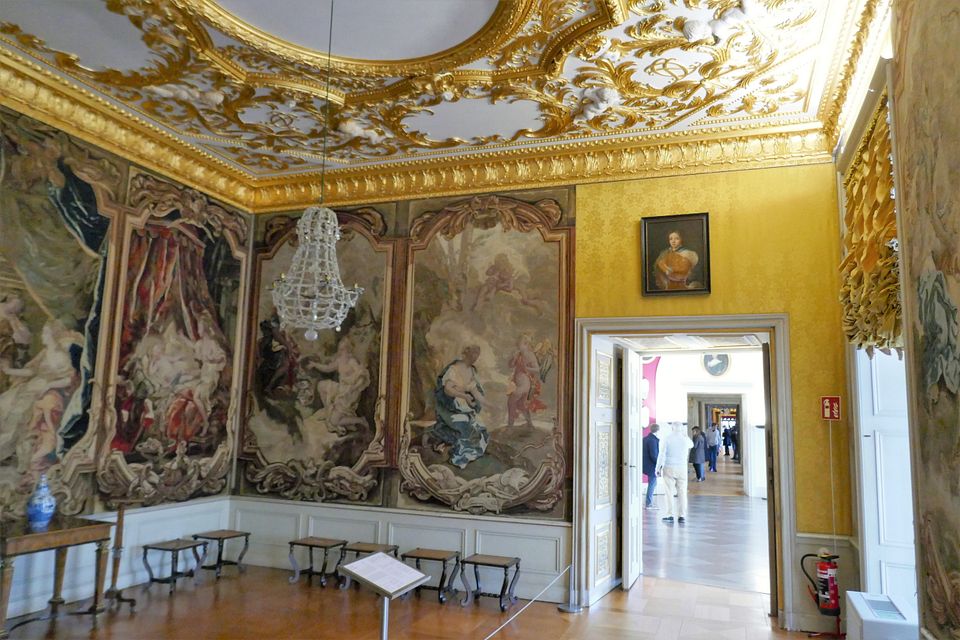
The Glassroom. This one had to be reconstructed from scratch based on photographs and descriptions.
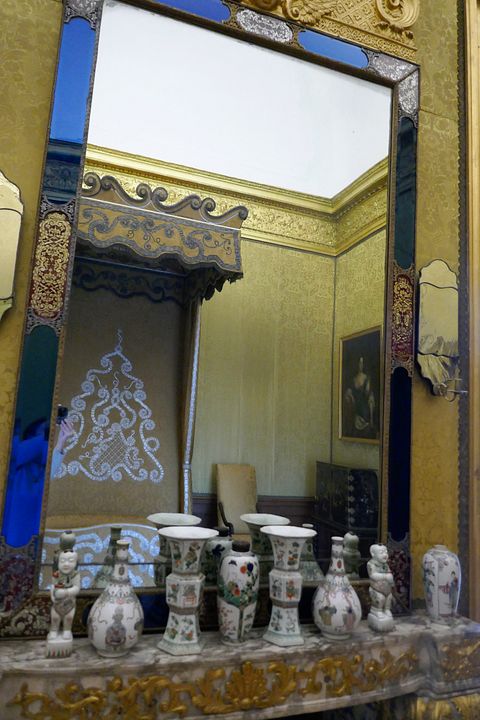
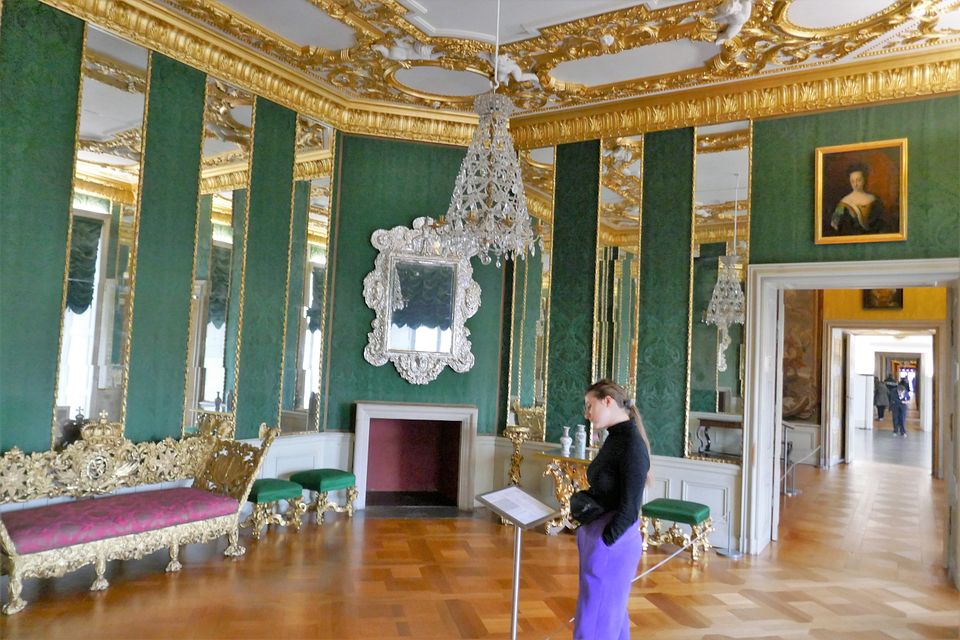
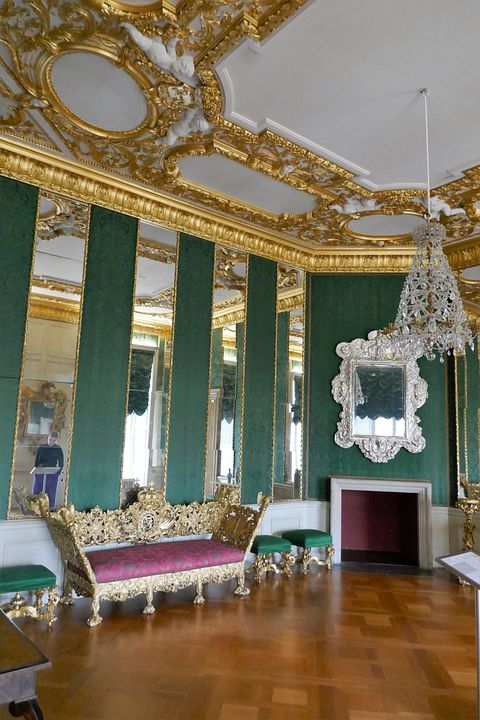
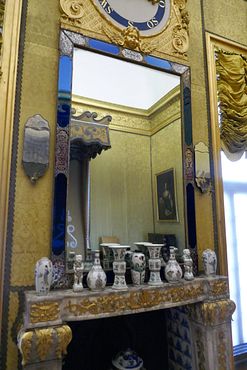
We're nearing a main salon, where I found a painting familiar to me from various biographies.
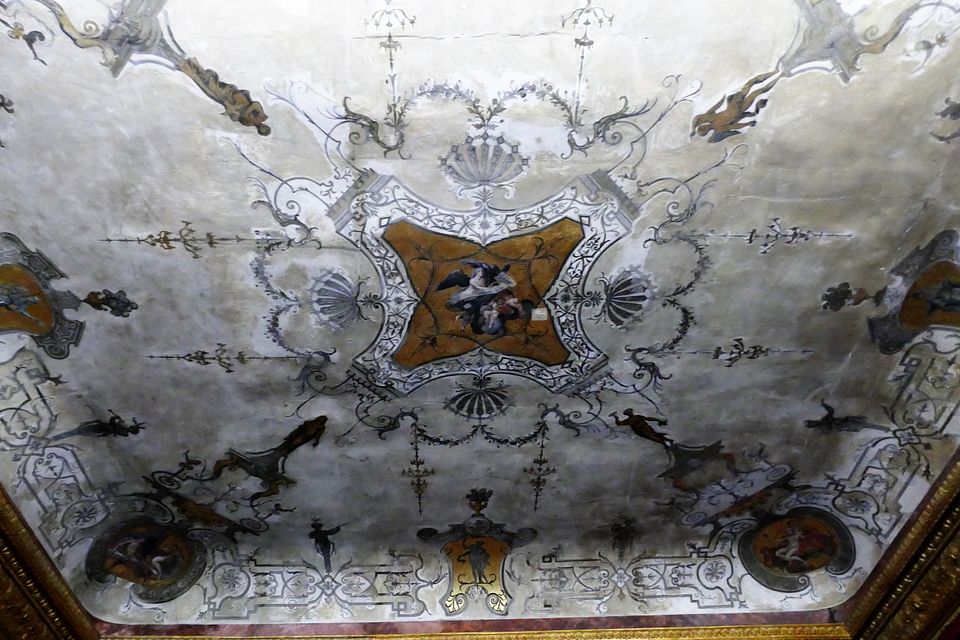
That's right, this dressing room is where Mom hung up the painting of twelve years FW as (the biblical) David. The crazy thing is, if you're familiar with pictures of adult FW, you can actually recognize it's supposed to be him.)
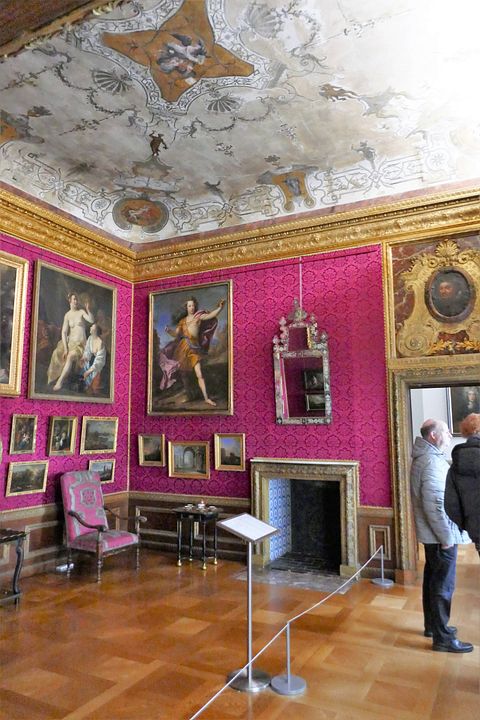
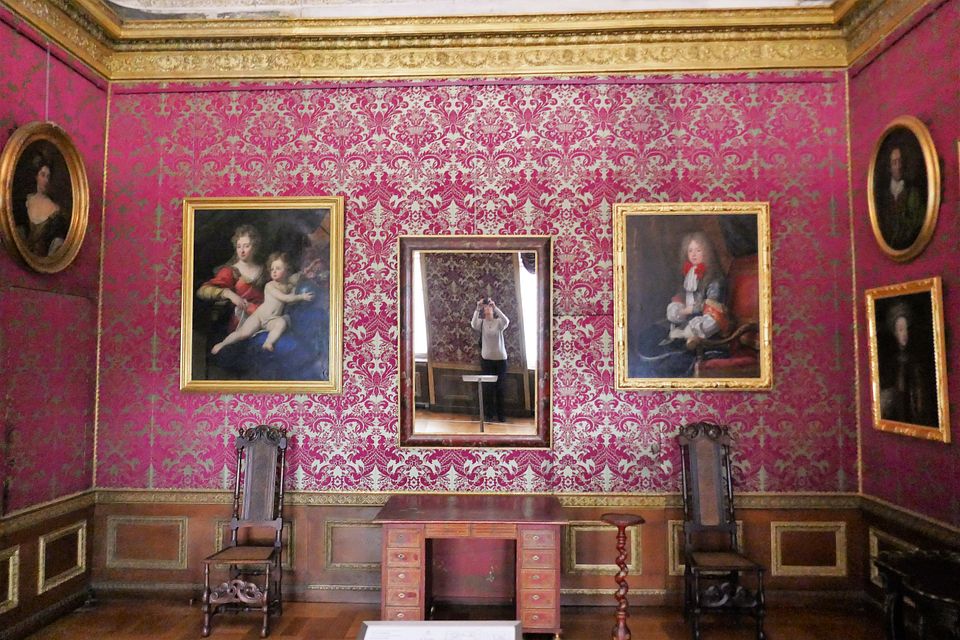
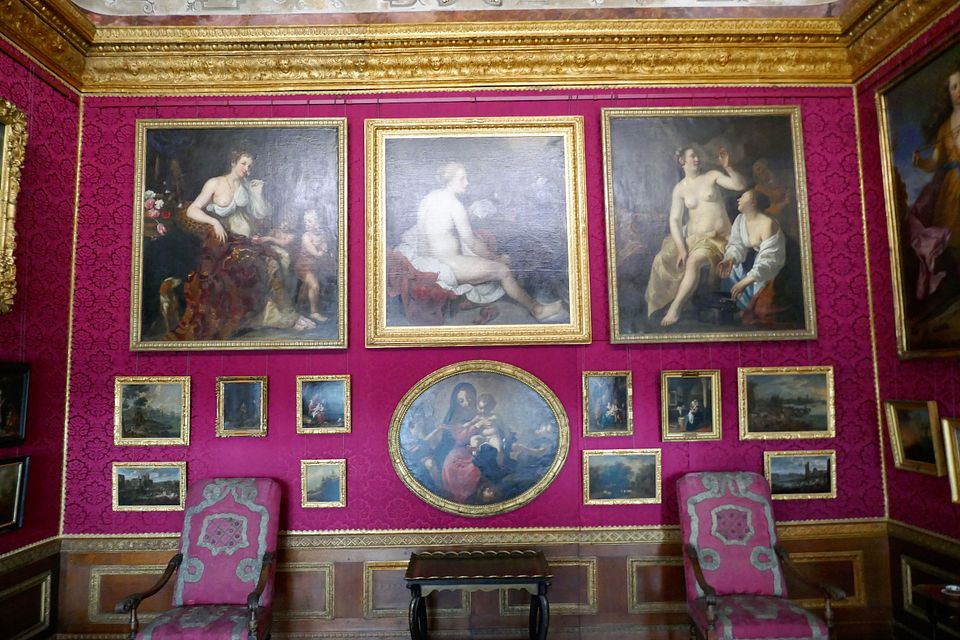
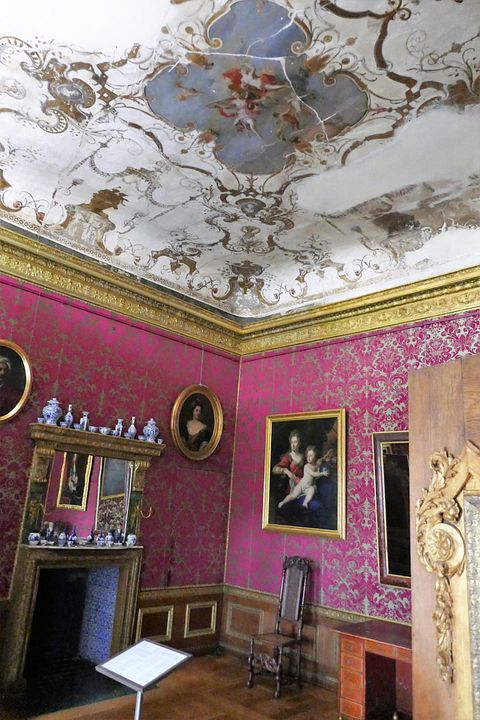
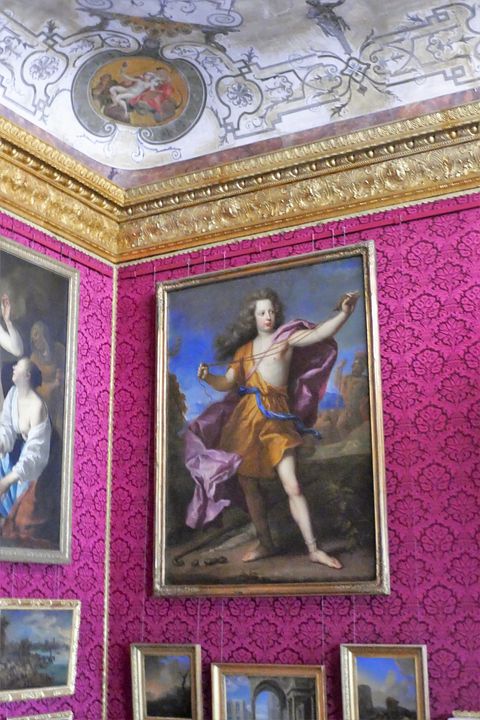
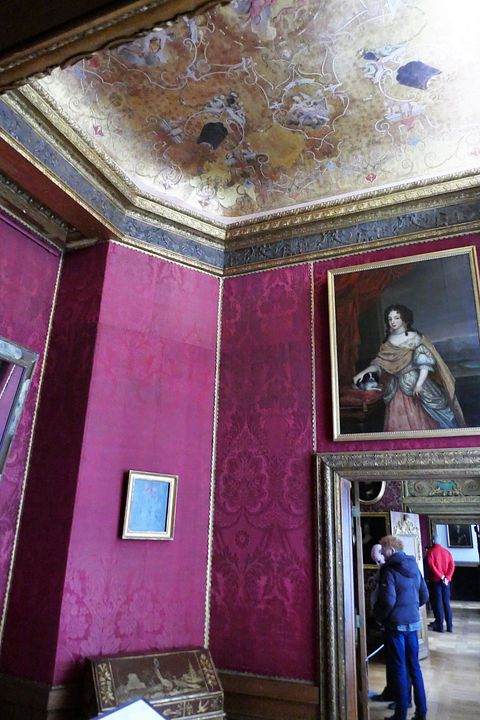
Bedroom.

The ceiling of the small "golden chamber" which was a writing cabinet next to the bedroom:
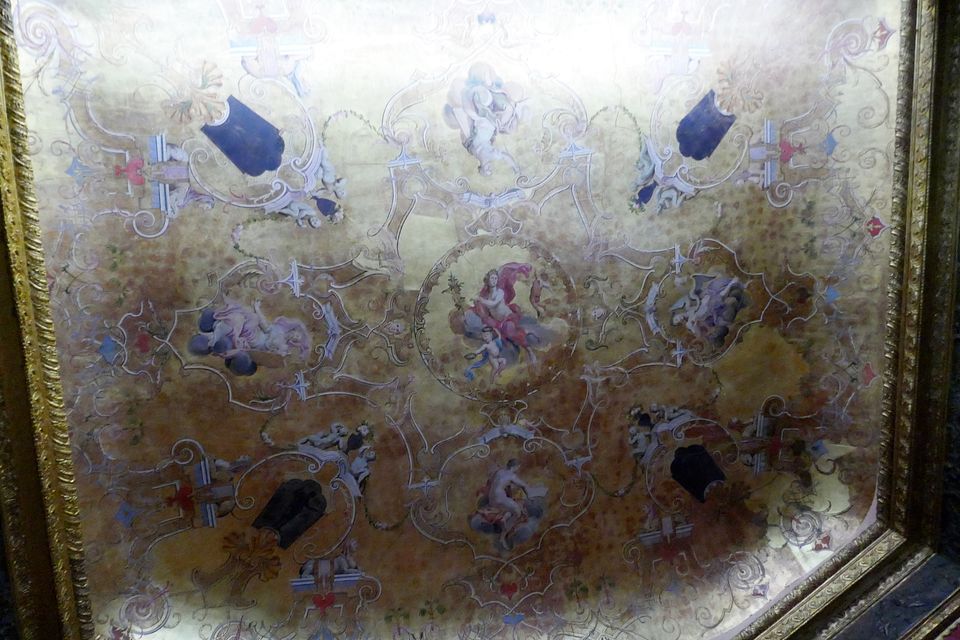
Naturally, the palace has paintings of the usual suspects, like SC's mother Sophie, she to whom the Hannover cousins will owe their British inheritance.
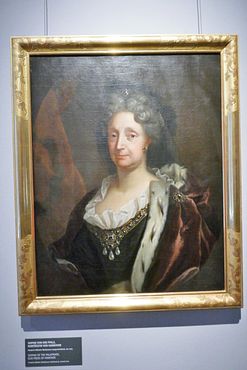
And here's SC herself, and Leibniz, who divided his time between mother and daughter who both were his patrons.

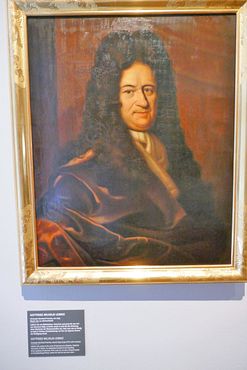
I had seen this in the F1 biographies but had not yet the chance to share, so here's the original: F1's Tobacco Parliament. Note there is actually a WOMAN participating. (His third wife.)
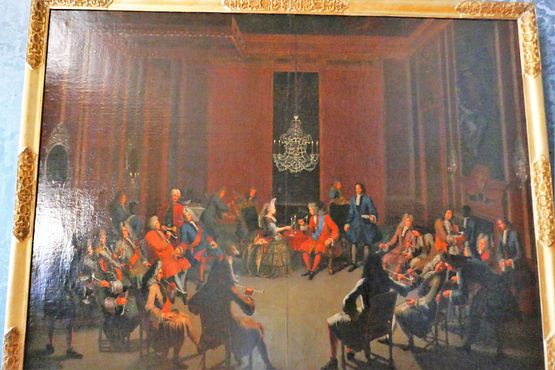
There are even paintings of G1's Turkish valet whom he took along to Britain and whom he ennobled, Mehmed von Königstreu, and of Eleonore Aly, the wife of SC's Turkish valet Aly whom she had brought from Hannover. (Remember, G1 and SC were siblings.)

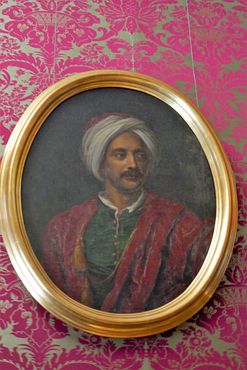
And, naturally, of both F1 and SC on the one hand, and FW and SD on the other. (FW closed down most of the royal palaces when he took over, but he did let SD use Charlottenburg every now and then.)

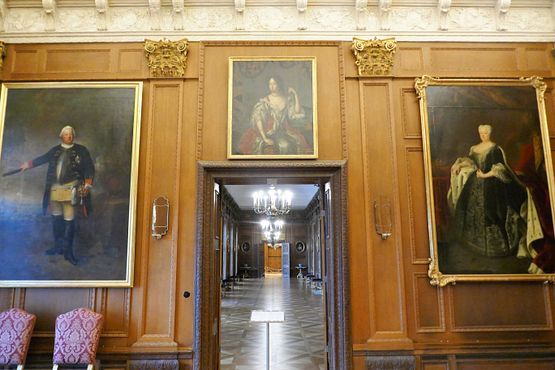
On to F1's rooms, when he was in the palace. (He and SC had an agreement that he had to ask for her permission first.)
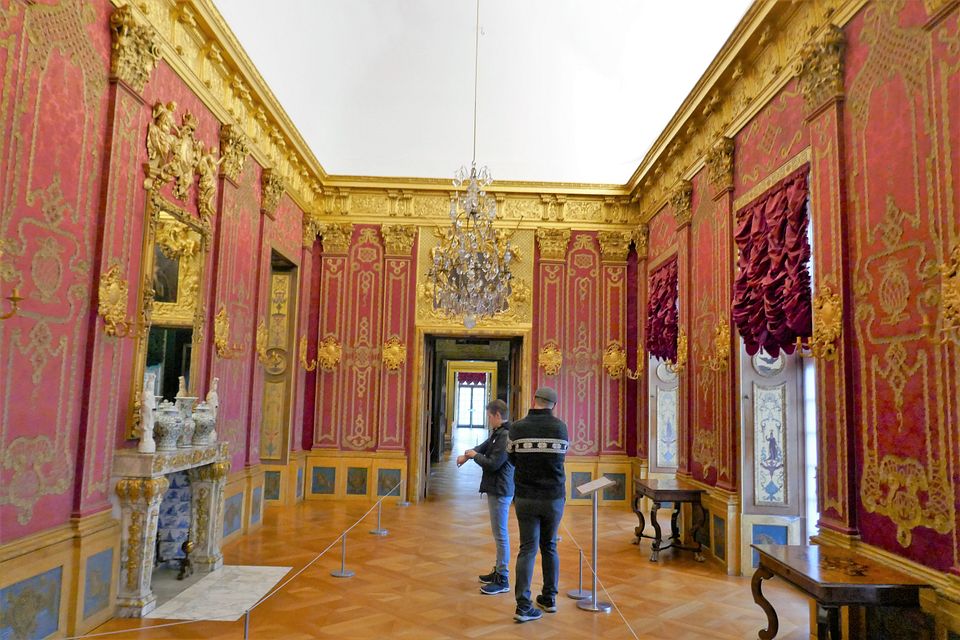
Note that there are a lot of combined isignia for F1 and SC, not just their initials but also the animals symbolizing their dynasties - the Prussian Eagle and the Welf Steed (which you should see in some Hannover palacesi n GB as well).
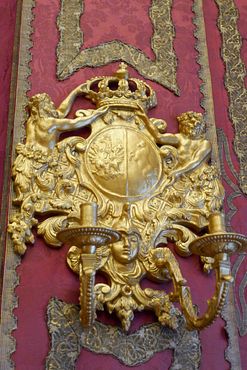
F1's audience room:
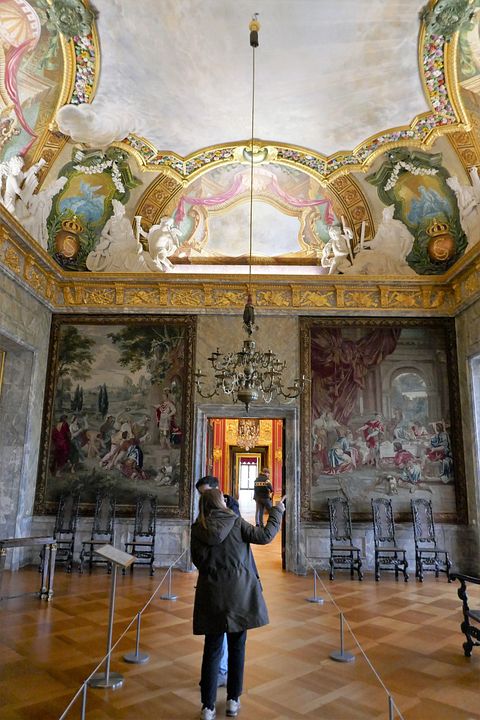
The Lower Oval Hall from which SC could go directly into the garden.
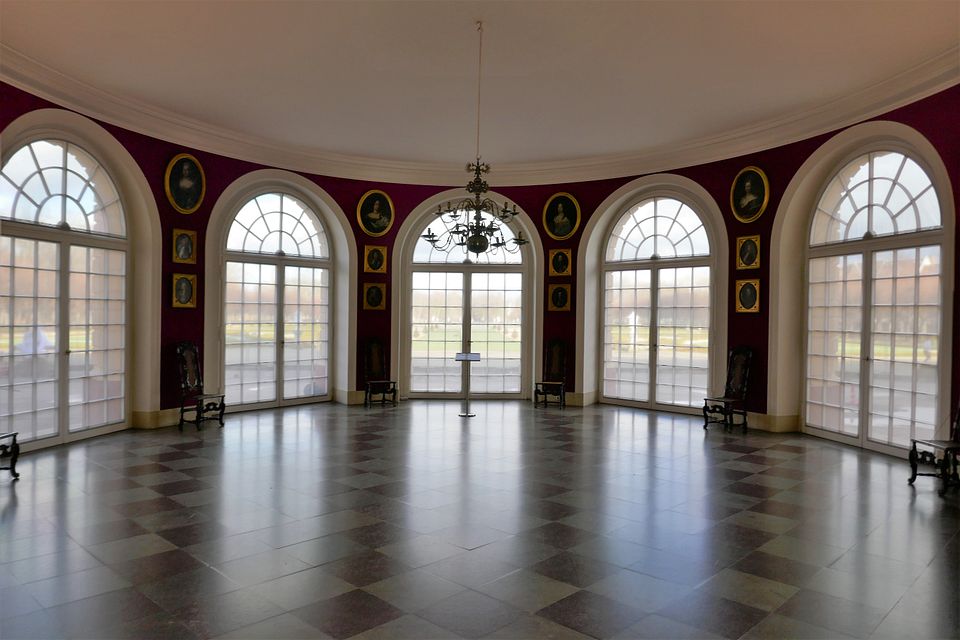
There's a small reminder here - and a longer one if you use the audio guide - to a rather infamous event in West German post war history, the 1967 visit of the Shah in Berlin. The grand reception took place here. Meanwhile, the protests outside turned bloody, and the shooting of an (unarmed) student by a police man is widely credited for triggering the German variation of the 1968 youth revolt and the radicalisation of many a student. (There is an additional irony: the cop who shot the student was actually a spy working for the Stasi, the East German secret service, something that only was revealed after his death.)
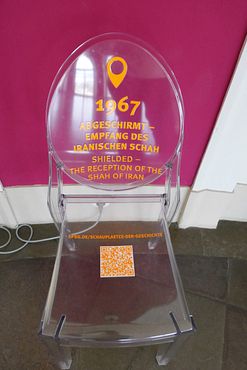
Back to Baroque affairs. When F1 collected China, HE COLLECTED CHINA. Behold the porcellain room:
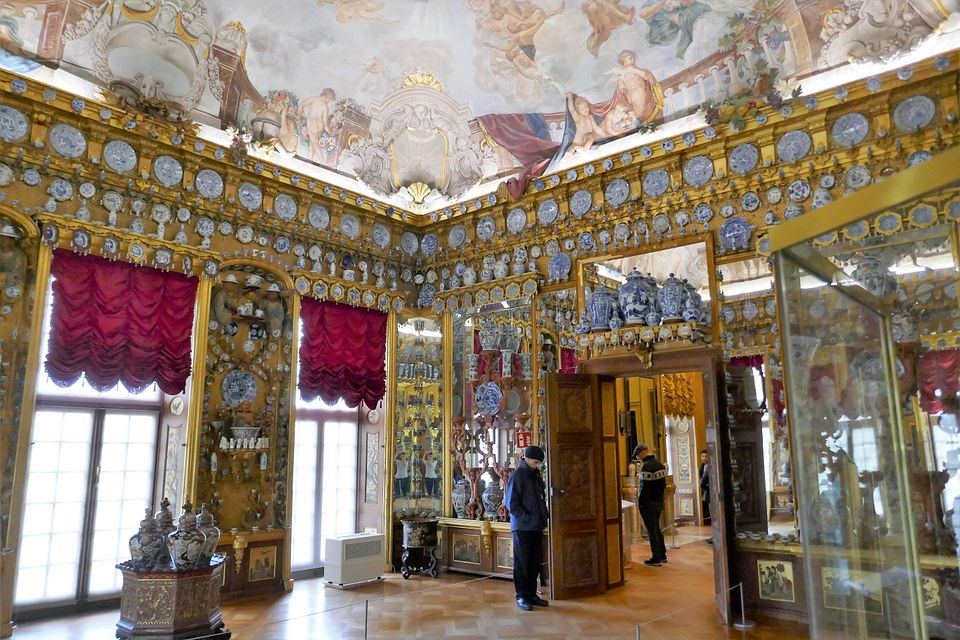
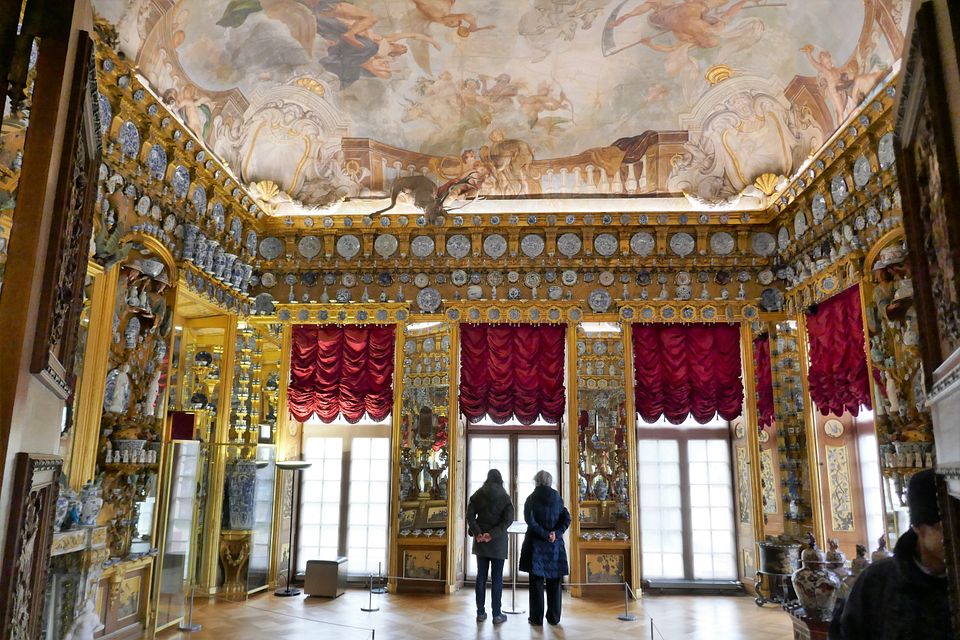
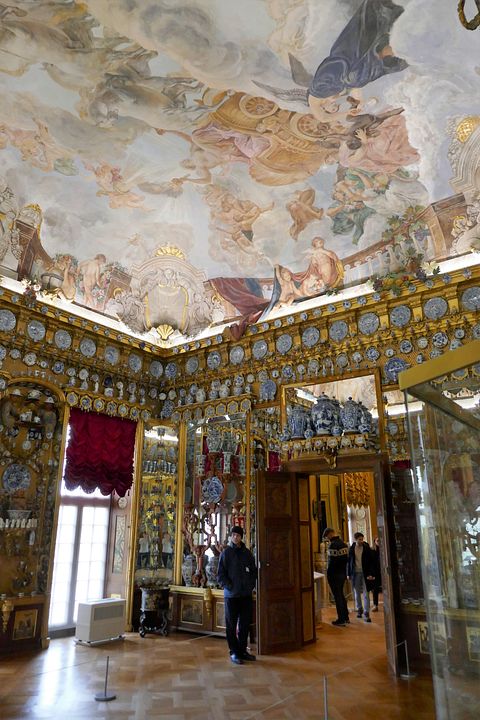
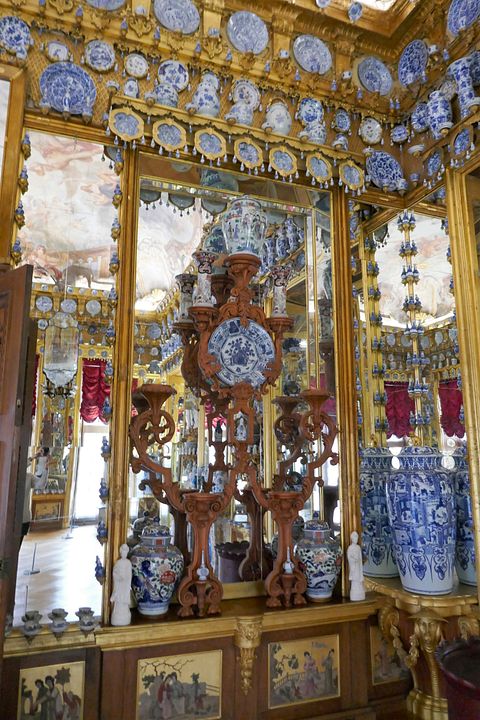

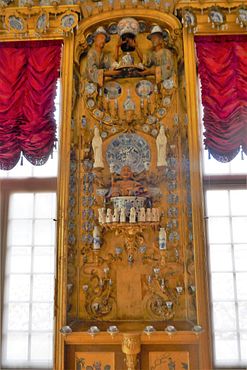
But we're not done with the Baroque yet. Now, the next part slew me. I've seen my share of opulent Baroque churches, believe me. But those were CATHOLIC baroque churches, who as part of the Counter Reformation went the extra mile in showing that they're the church with the splendour. F1, let us never forget, wasn't just a Protestant, he was a CALVINIST. And yet, when it came to the chapel (ahem) of Charlottenburg, he commissioned something which would have given good old Jean Calvin apoplexy. Behold:
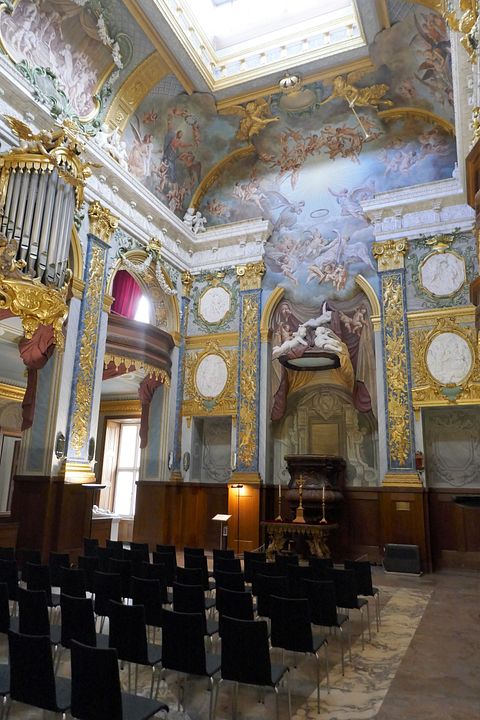
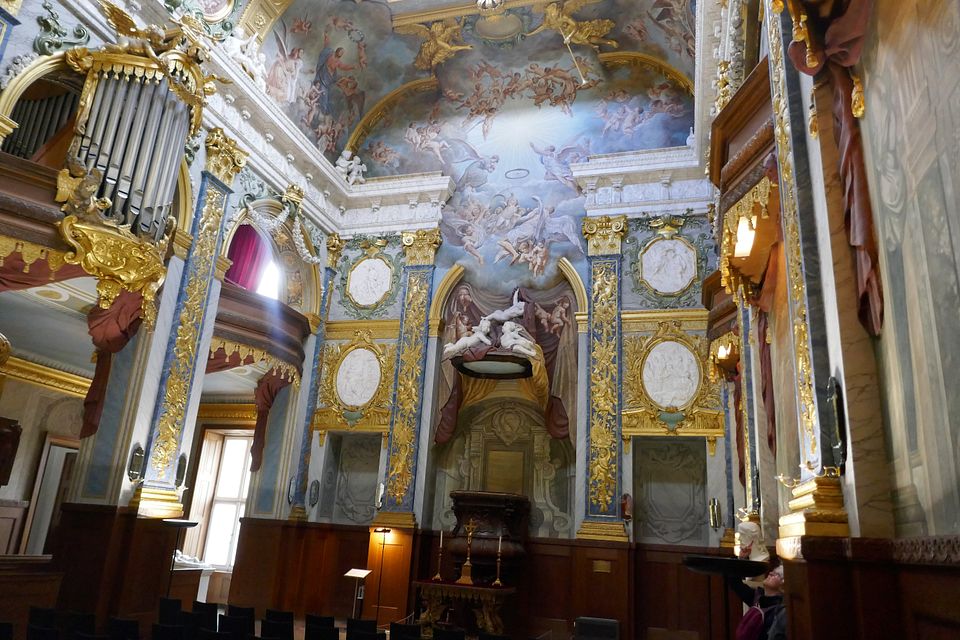

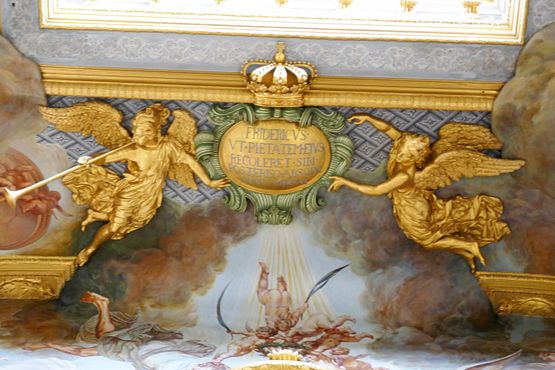
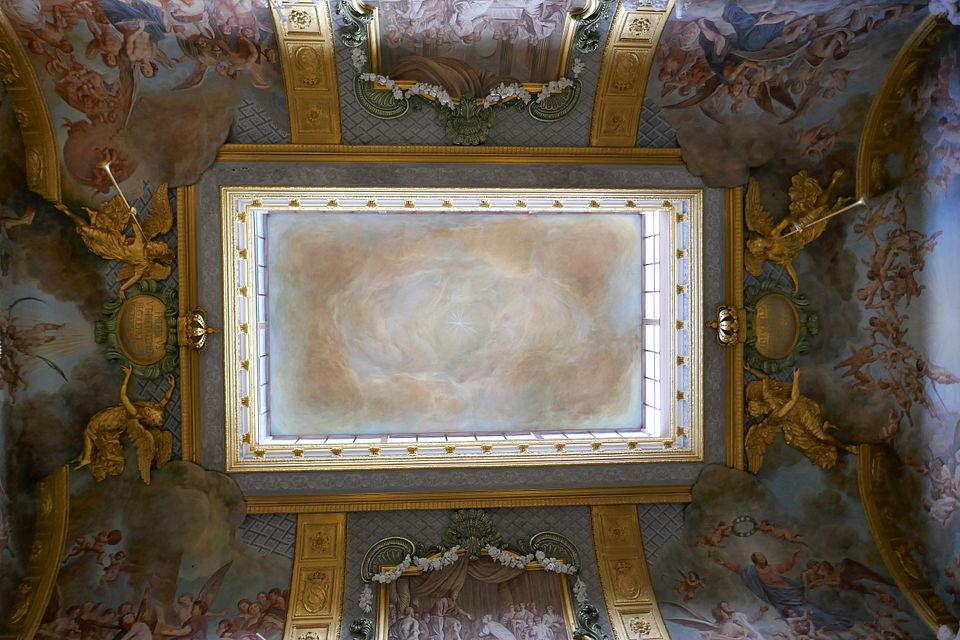
Leaving the Old Palace behind, let's go to the New Palace, where a visitor experiences the rooms in reverse chronological order.
These rooms were actually being decorated for EC in 1740, which I found interesting, - did someone not get the memo or did Fritz consider living with her nominally and then changed his mind during Silesia 1? - but hardly had they been finished that she had (been) settled in Schönihousen for good, so she only rarely lived there, i.e. if there was a grand celebration she was actually invited to. Later, the rooms were completely refurbished and repurposed to serve as living rooms for FW3 and his Queen, Luise. Given Luise's famous hostility to Napoleon, I have to wonder who had the idea to put all the David paintings there?
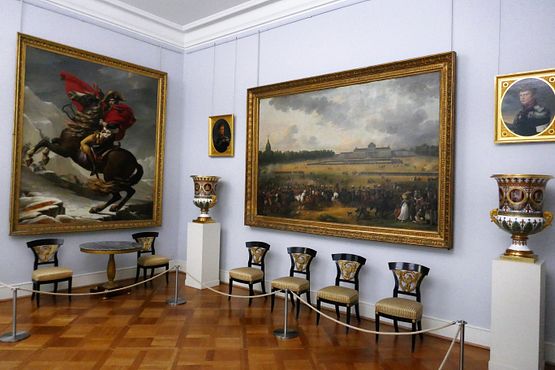
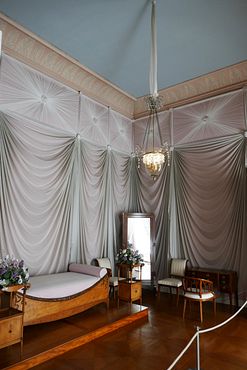
Even later in the 19th century, but cool, so I took a picture: a panorama painting from 1832, showing the view from the Friedrichswerder Kirche. That Berlin was gone even before WW3, so it's a glimpse to a lost world, only a century after our main era:

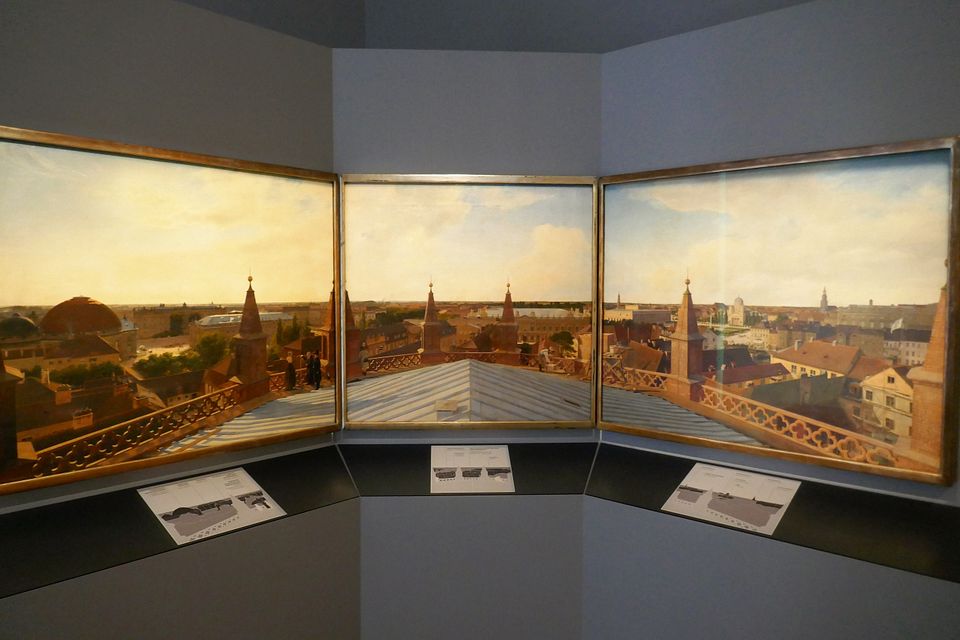
FW2, Fritz' much mocked nephew and successor, Dad to FW3, had both summer and winter rooms in this part of the palace, and they were so very pretty I took a lot of pictures. The plaques informed me his mistress, Wilhelmine Encke, Gräfin Lichtenau, did the shopping and selecting for him. She is described as a"the King's mistress, confidant and advisor" as well as "a woman of style and taste", which would have driven FW3 who hated her and who behaved incredibly petty nuts, but I must admit I felt gleefully satisfied, because yes, going by those rooms, she had plenty of style. (Frederick Hervey, Earl of Bristol, Bishop of Derry: I agree!.)
The summer rooms:
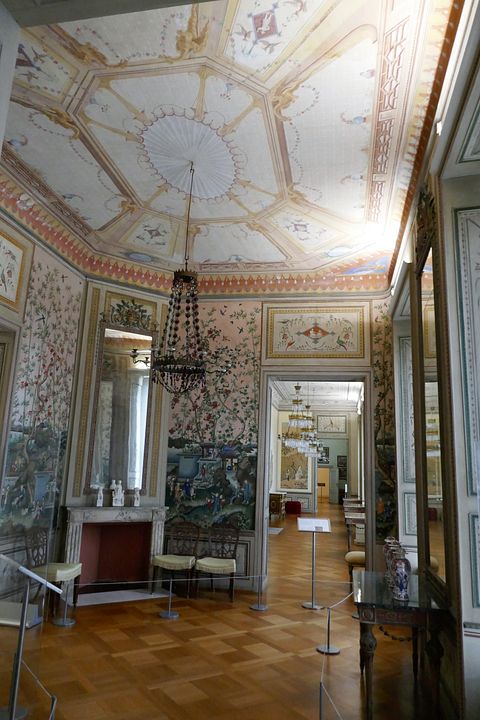
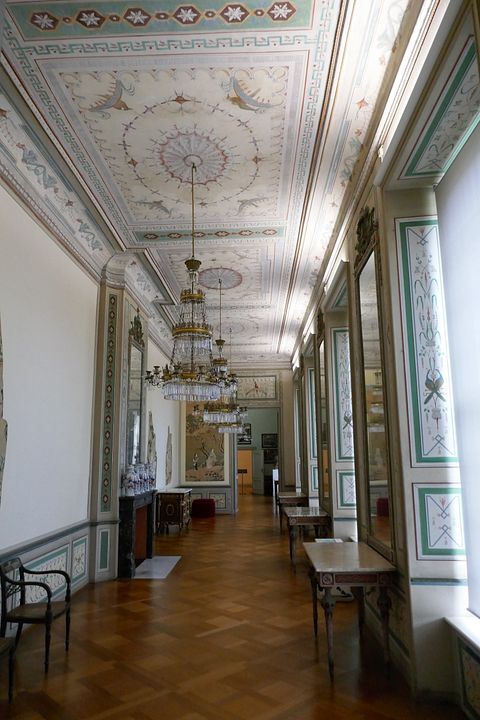
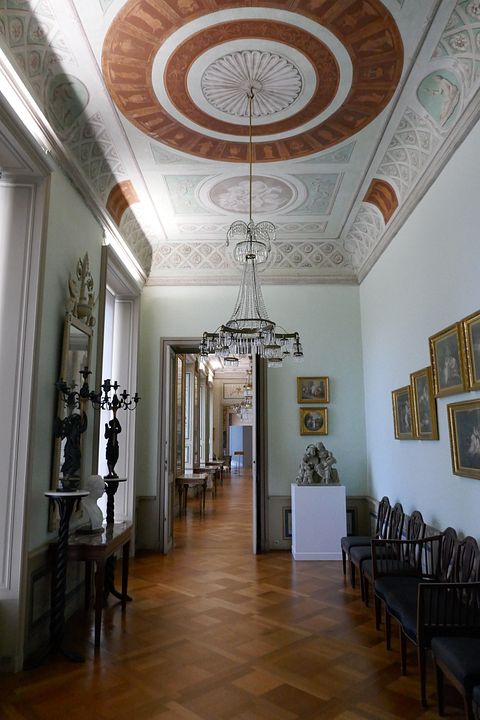
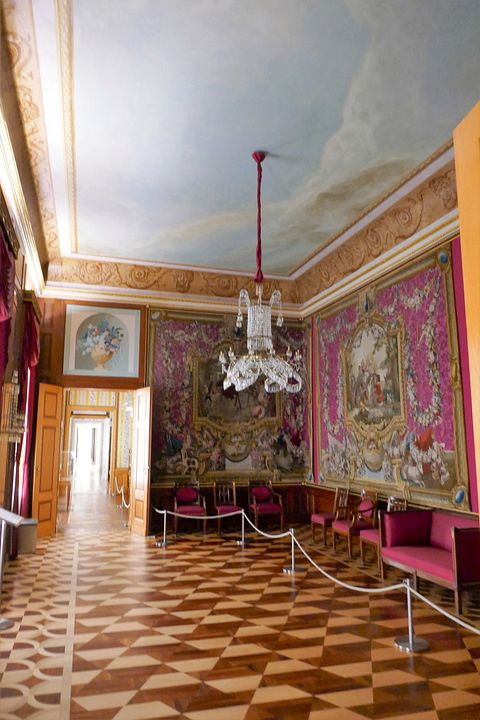
The winter rooms:
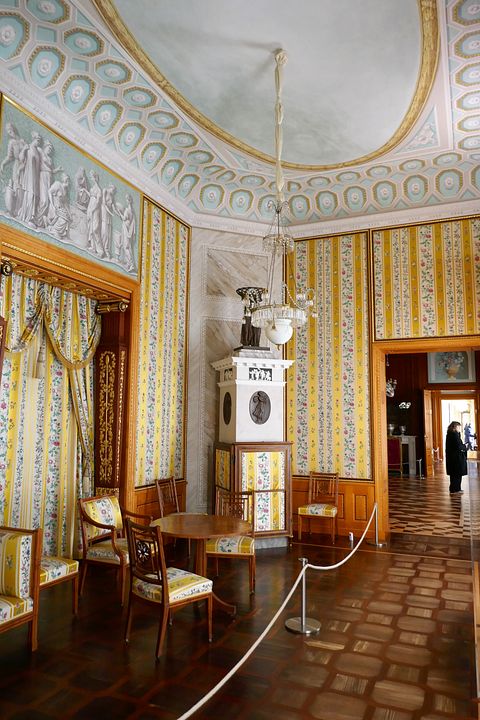
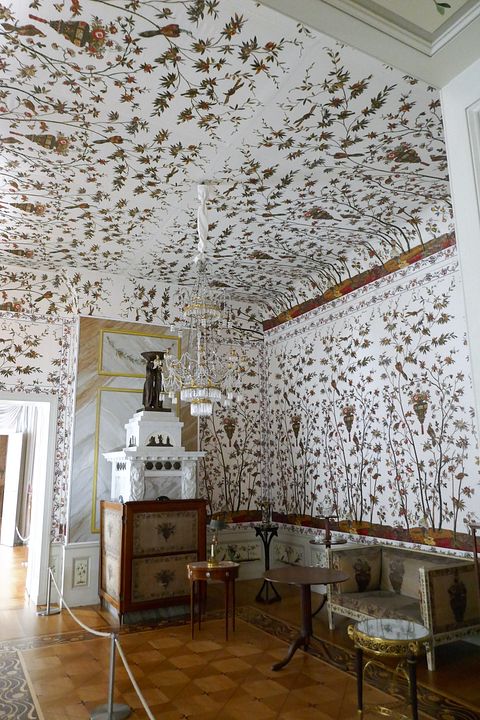
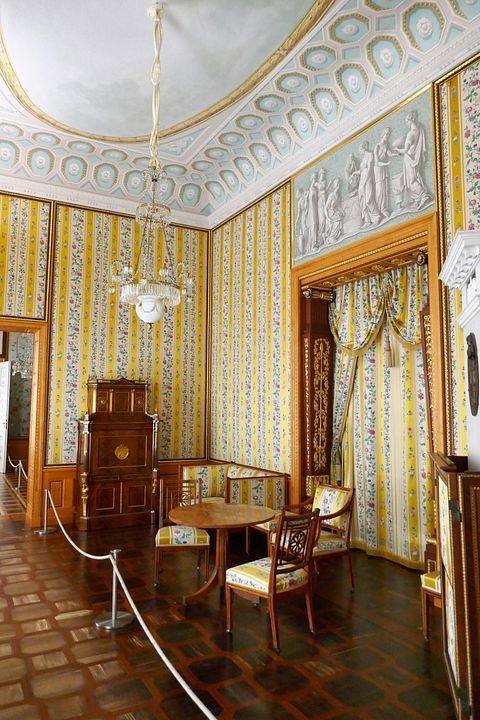
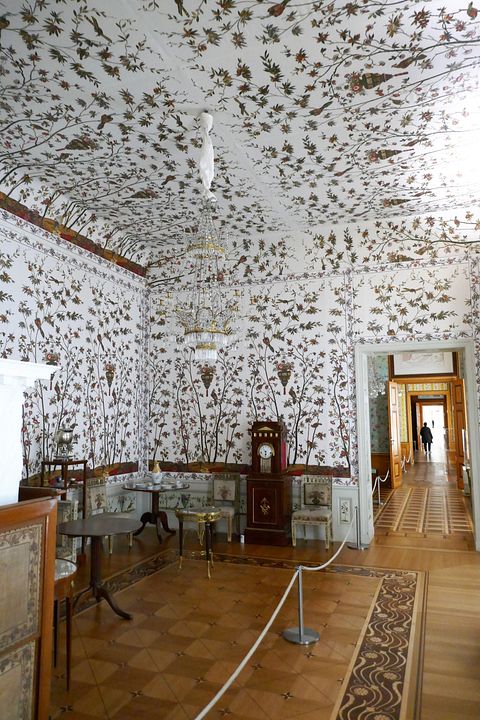
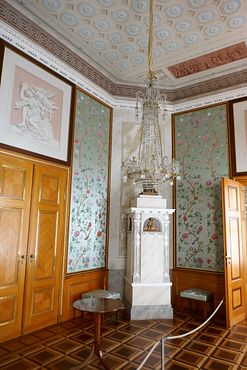
Now comes a section which is a Mildred special - MAPS MAPS MAPS! Showing how the Hohenzollern went from medieval robber barons to princes elector to dominating German power.
You know, this lot are the forefathers. From Hechiingen in Swabia, before they went East. This is the "Ahnengalerie", the gallery of forefathers.
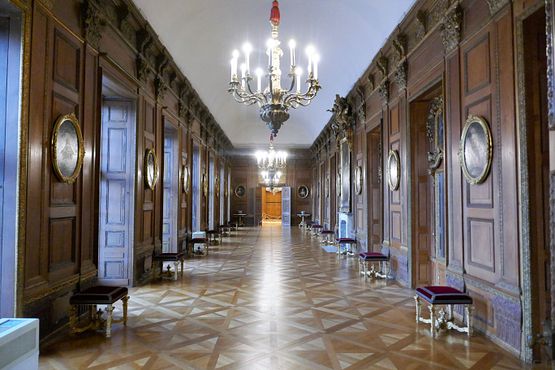
Some forefathers, and the territorial aquistions through the centuries, with always the outlines of modern Germany sketched in so you can see where that was by comparison.
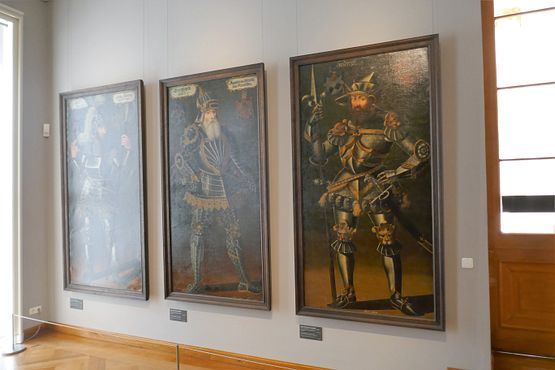
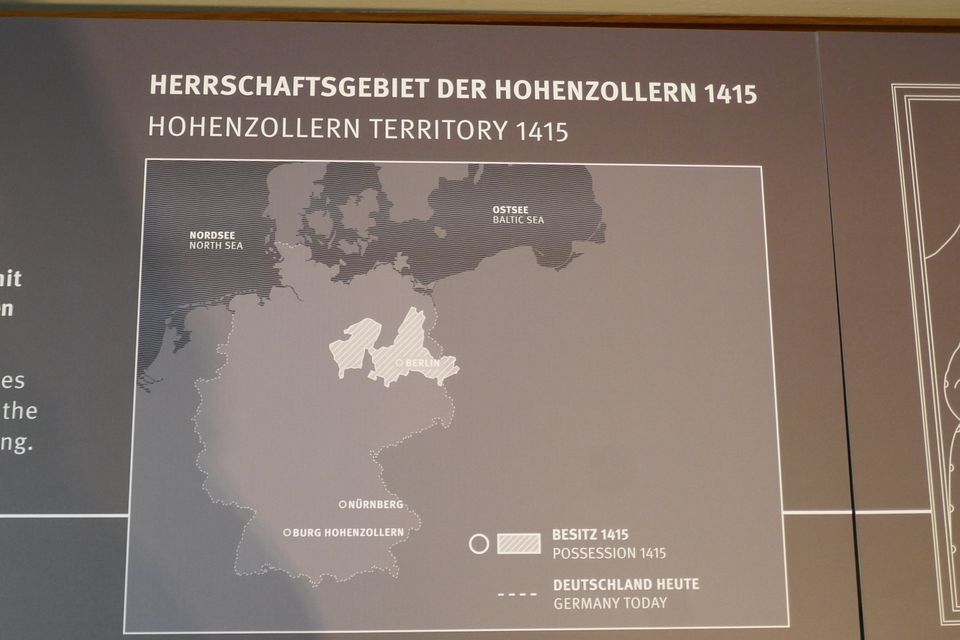

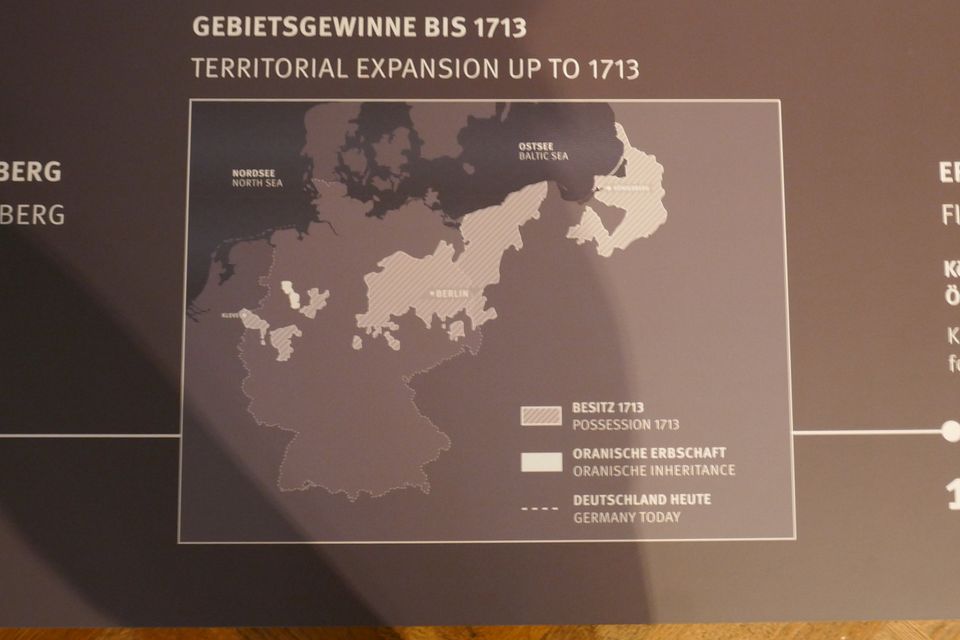
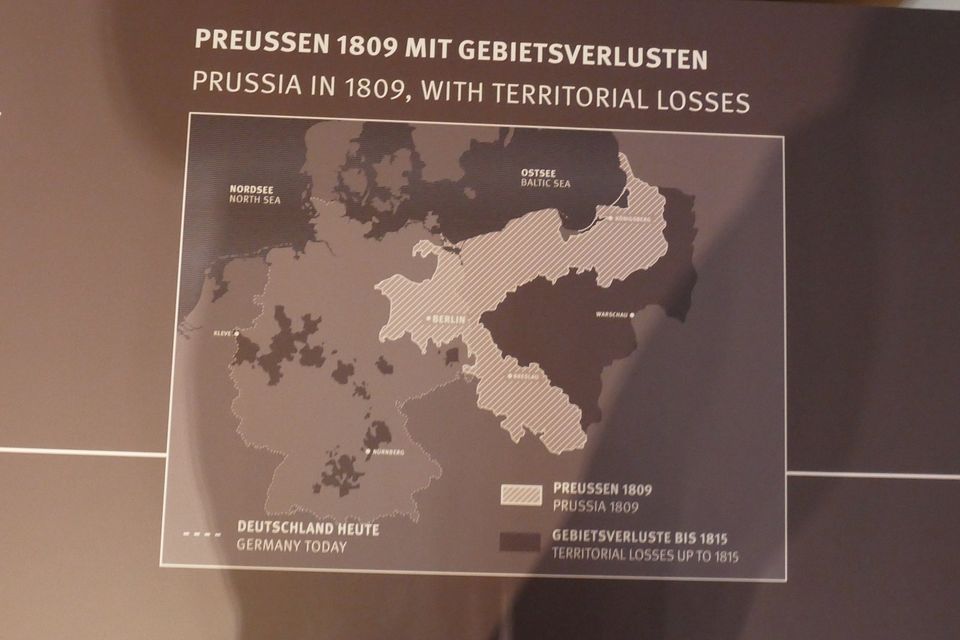
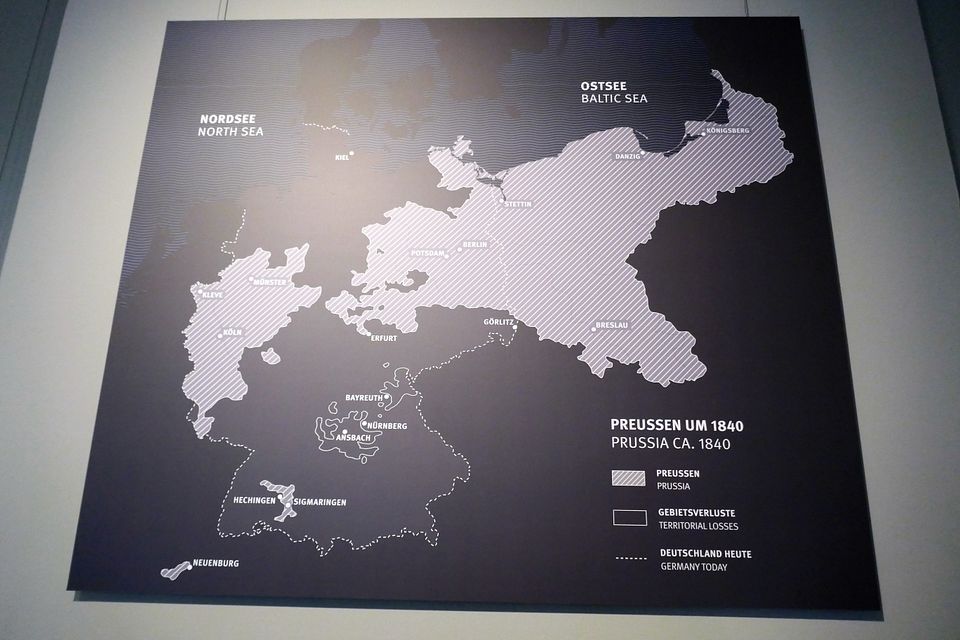
And then there was the Empire. Well. We all know how that ended. Except for the current chief Hohenzollern, Georg Friedrich, the one who sued the state of Brandenburg and the Federal Republic because he wanted some cash compensation and experienced major backlash, to put it mildly. He did succeed in getting many a plaque to say "property of HRH Georg Friedrich of Hohenzollern".
First, there's a small Pesne collection. Originally, every grand room had a big ceiling paintinhg by him, but that was burned to ashes. What survived were small paintings meant as studies for later large ones, like the following ones, starting with SD's first baby boy who died as a baby, Friedrich Ludwig. As I said elsewhere, the small black child holding the umbrella appears to be the same (somewhat older then) boy doing just this in the painting of toddler!Wilhelmine and baby!Fritz, so I wonder what became of him - I don't recall any of siblings ever mentioning him.
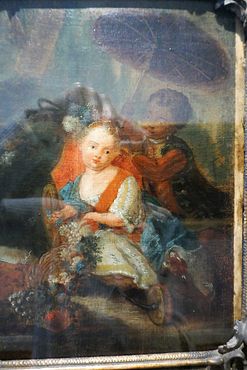
Then there are paintings of F1's coronation at Königsberg and of August the Strong visiting FW and family in 1728.

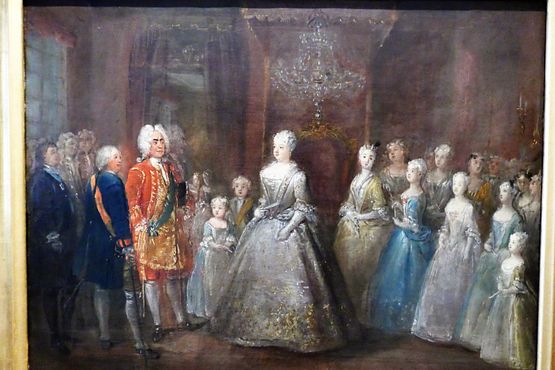
And here's Caesarion himself, Keyserling, aka the guy all the envoys thought would be Fritz' almighty favourite in 1740 and who instead was told by Fritz that he was very very fond of him, but did not take him serious at all.
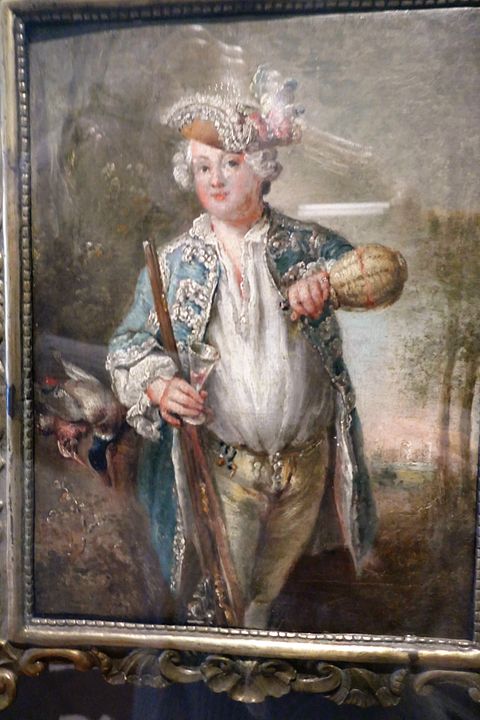
Pesne also did some erotic paintings for himself:

Post Antoine P. room, we're entering the rooms Fritz & Co. lived post 1740. The first one, the Blue Atlas Room, also contains a model of Charlottenburg with a thoughtful map and inscriptions as to which sibling had their wedding, apartment or grand party in which part of the palace:
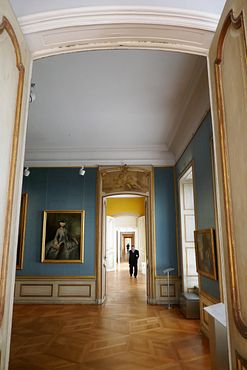
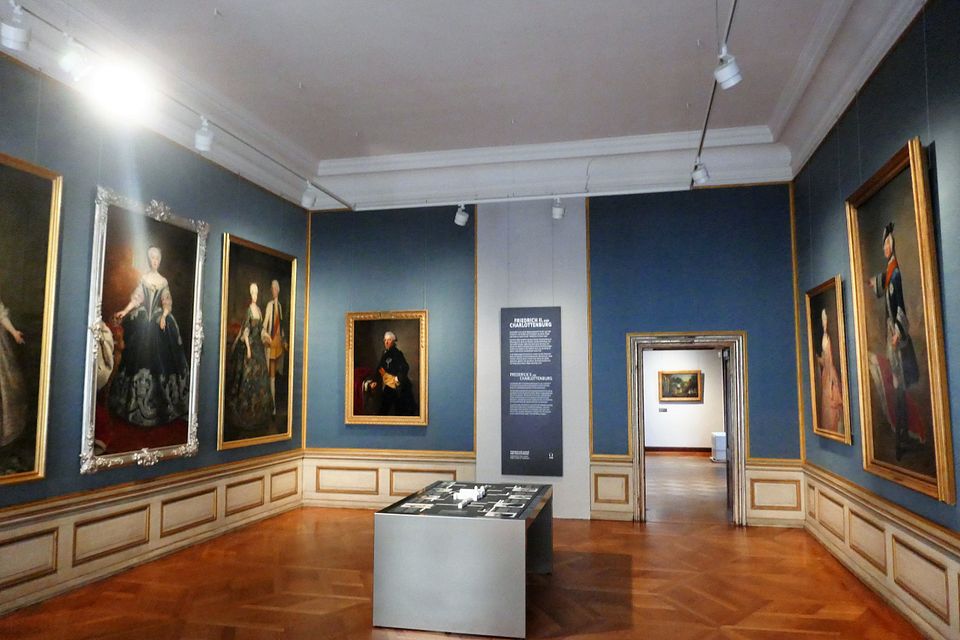
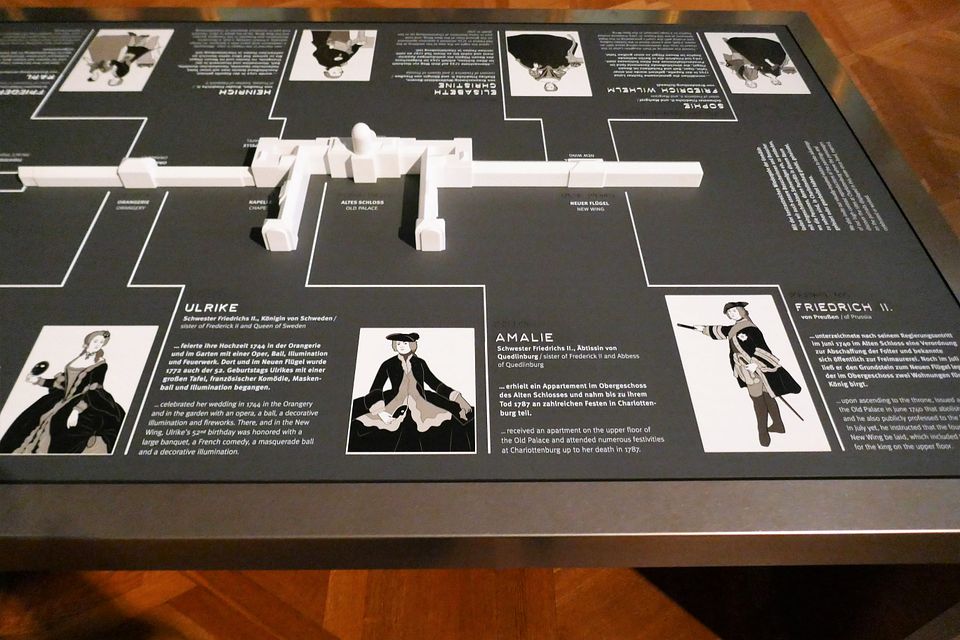
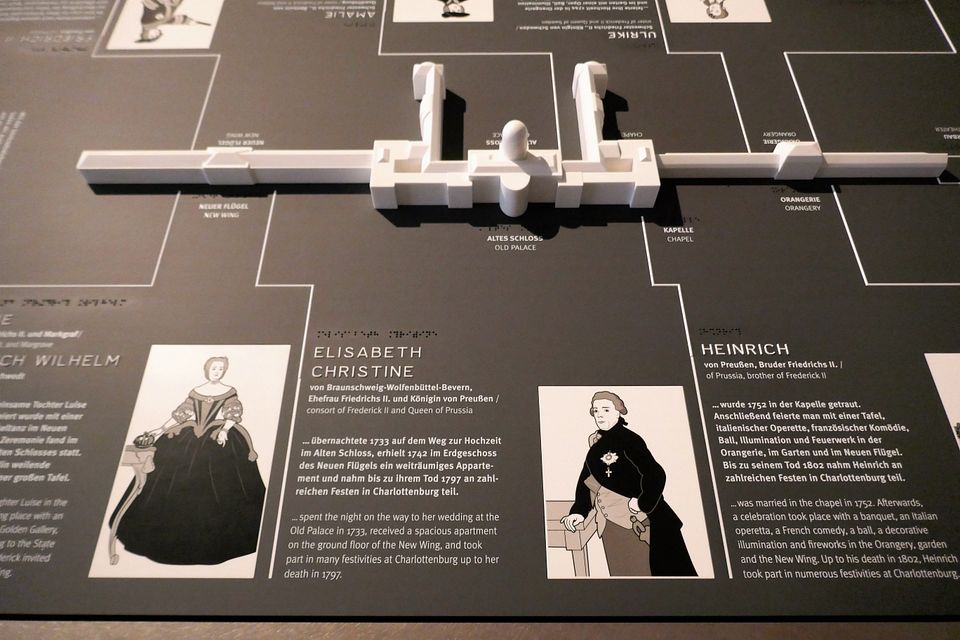
Yes, that's where Heinrich married poor Mina, to their mutual misery. Lehndorff gave us a detailed description of the festivities in his diaries.
Speaking of Heinrich, there's a copy of his best known old age portrait and one of Amalie's best known portrait in this room:

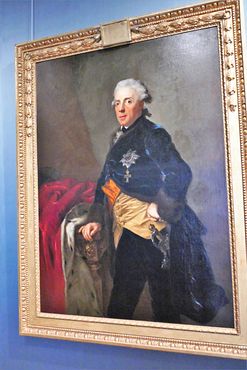
As mentioned, Charlottenburg was where many a grand ceremony and party took place in the Frederician era. Hence the size of the dining room:
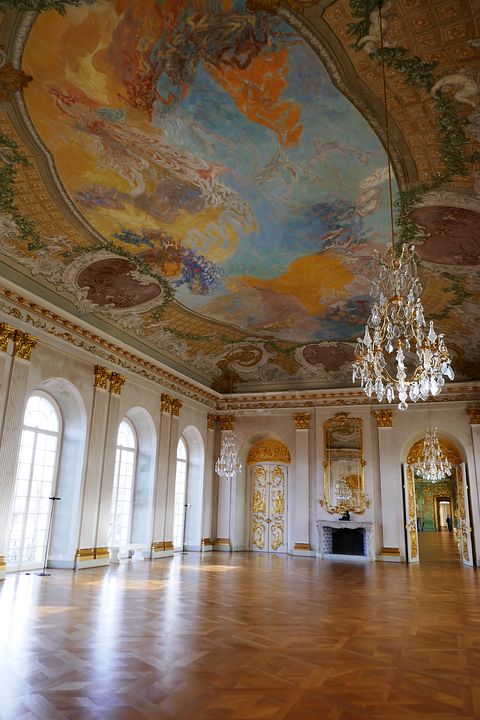
And the ball room, aka the "Golden Gallery":
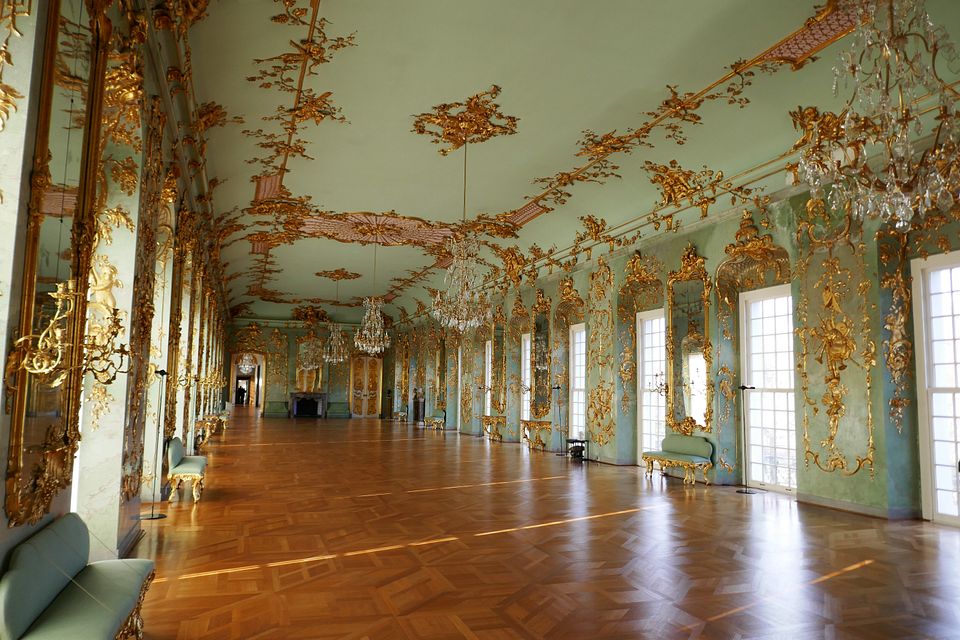
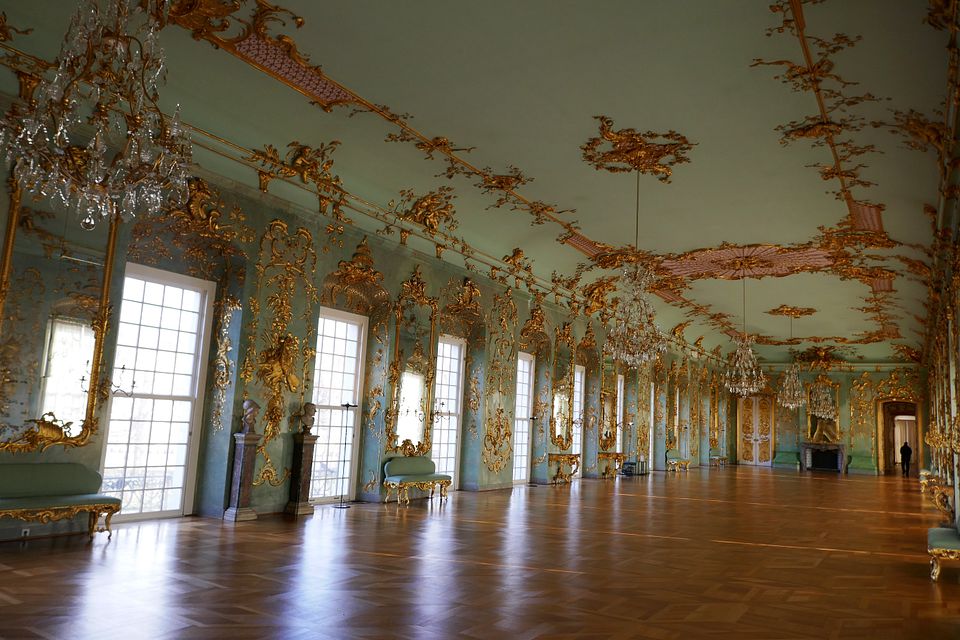
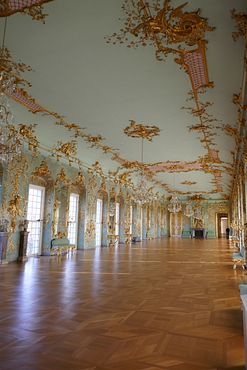

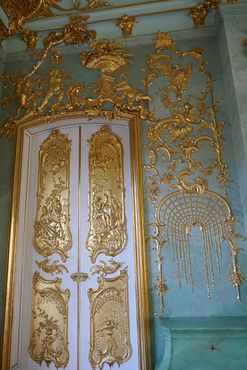
After the Golden Gallery are the actual living quarters, like the silver room:
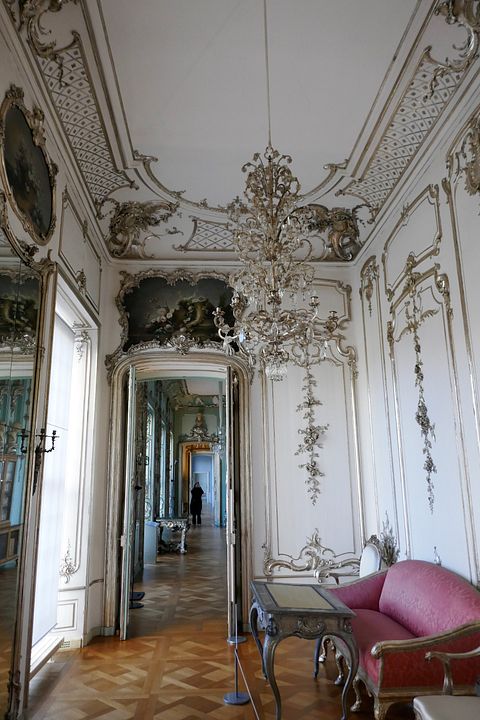
The Yellow Atlas Room:
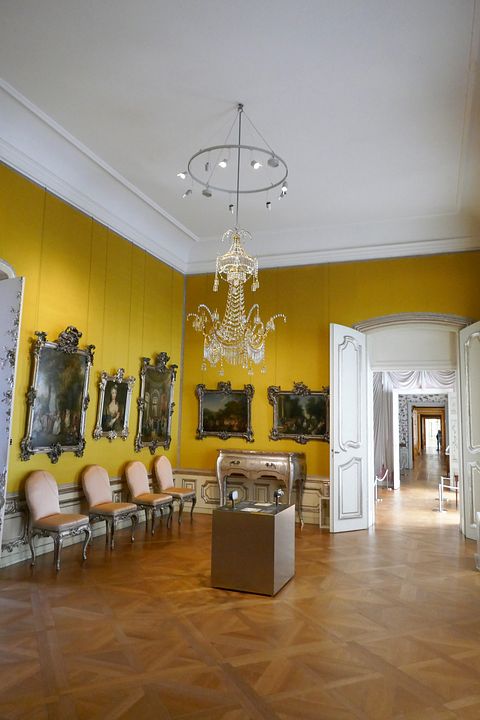

The Gris de lin Chambre:
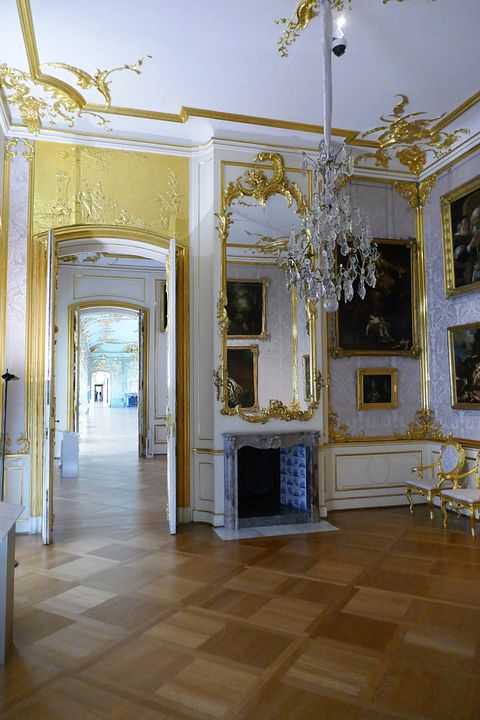
One of two writing rooms:
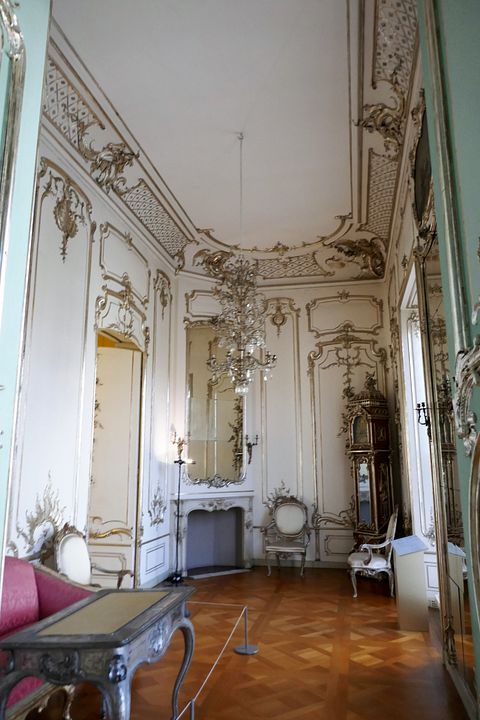
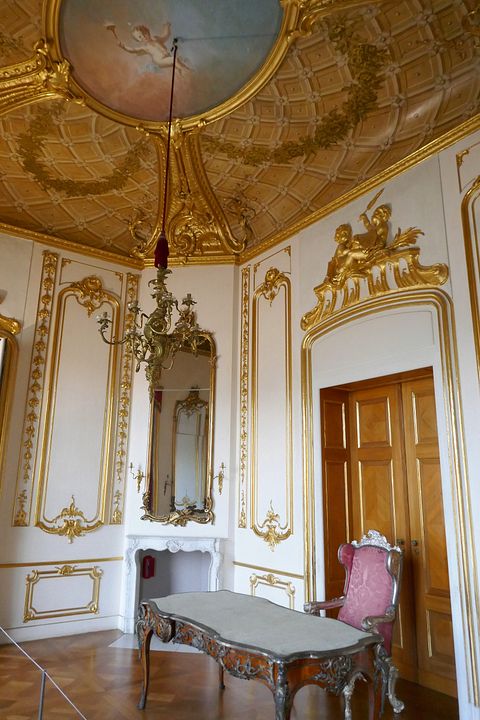
Naturally, a music room:
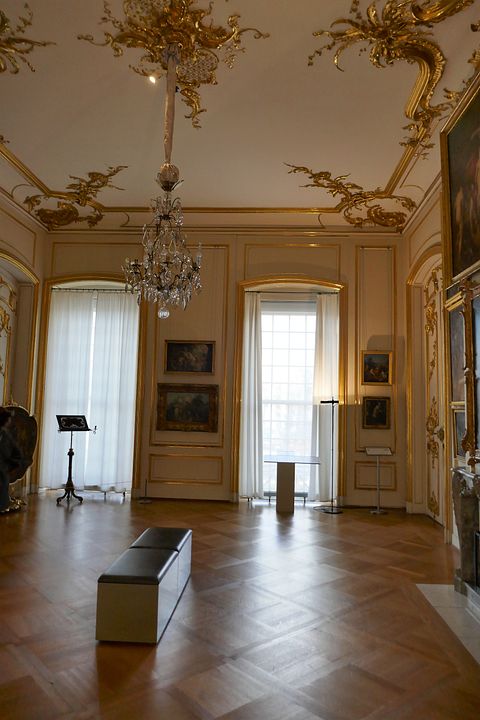

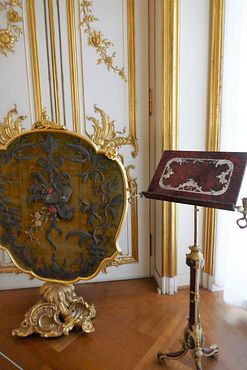
And a library:
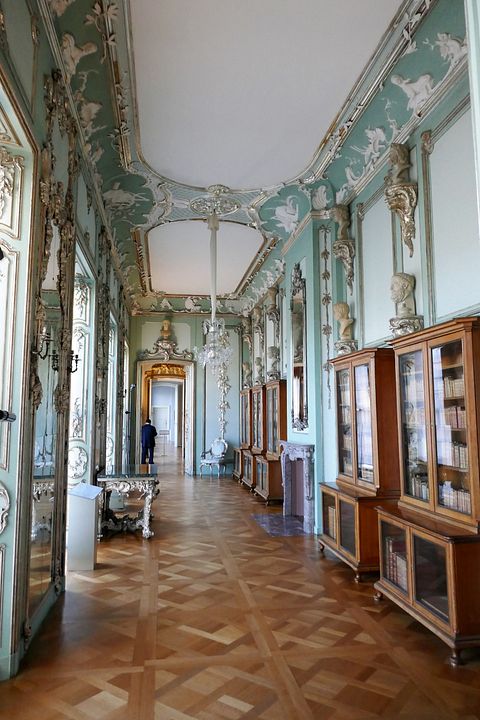

With Voltaire volumes, because Fritz literally could not live without them, and he had all libraries in any palace he resided in contain the same books:
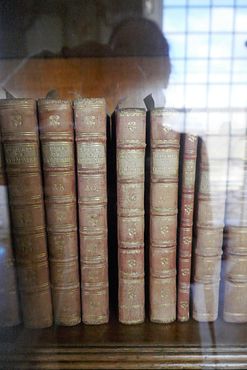
Main working study with the type of slanted desk you also see at Sanssouci:
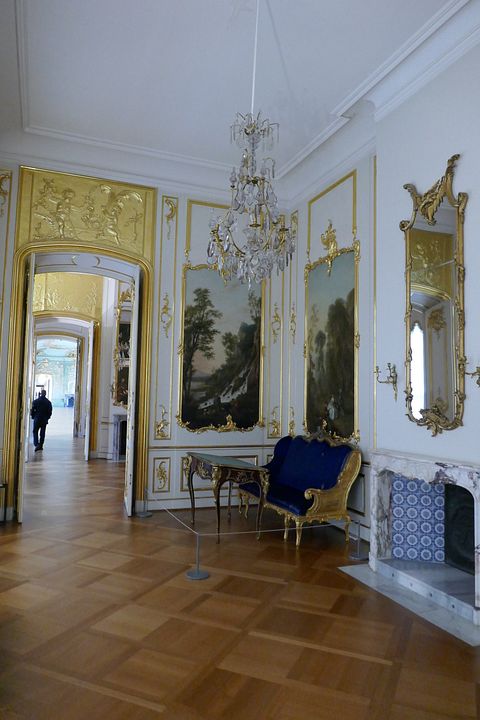
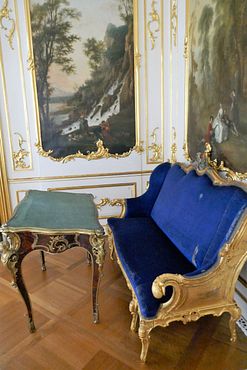
And monogrammed fireplace:
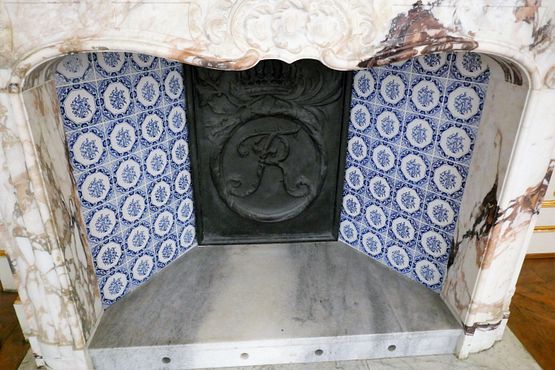
Now, as mentioned the whole palace had so much WW2 damage, but you know what survived? I may have said "are you kidding me?" out loud. What made it through the centuries undamaged is Fritz' porcelain loot from Saxony, Meissen, to be precise.

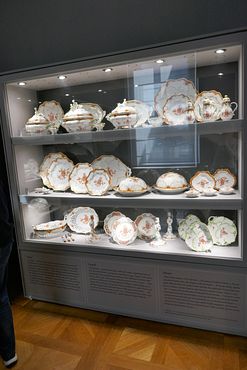
How to we know this is the very porcelain Fritz brought home from the 7 Years War? It was inventoried. Also he actually commissioned, i.e. ordered the Meissen factory to create avery special set for him: a warrior lounging on the Saxon fleshpots:
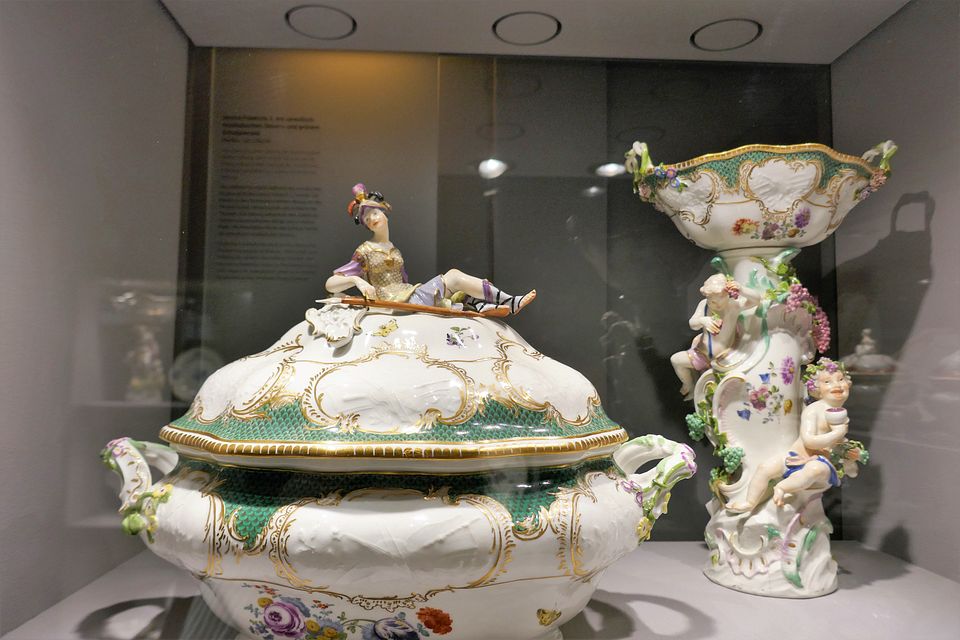
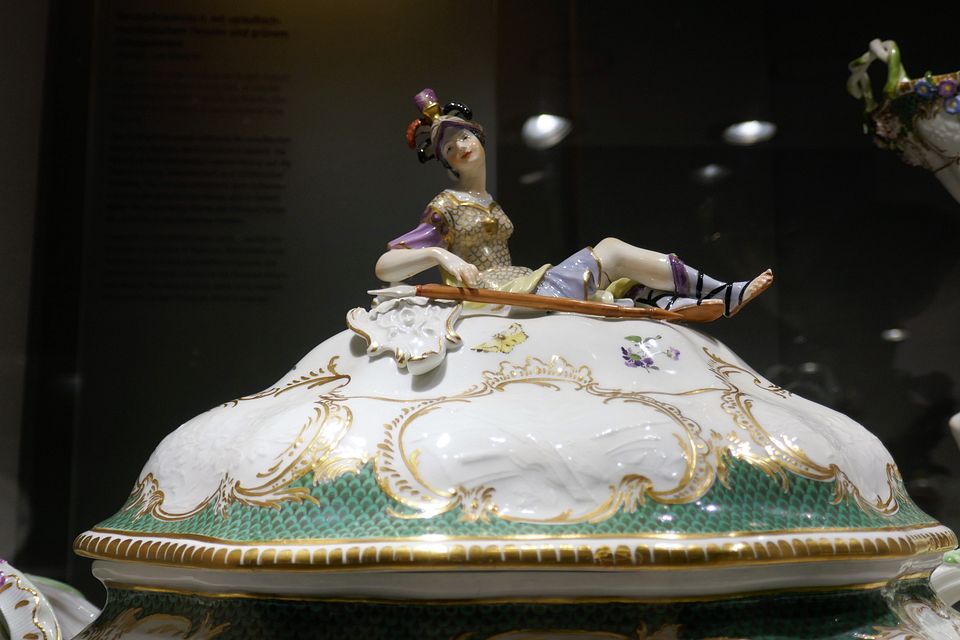
Subtle, Fritz. Very subtle.
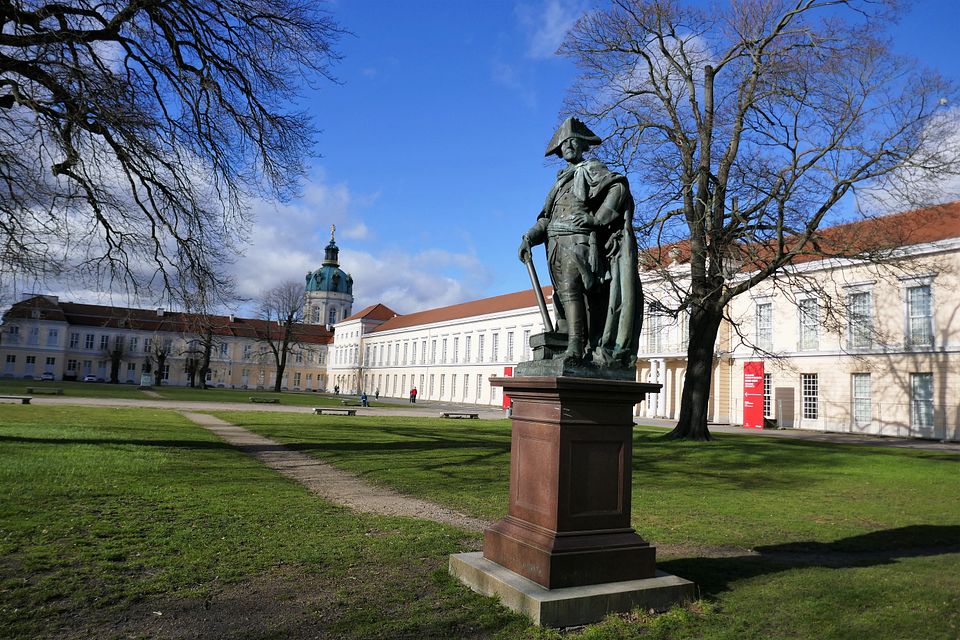
(BTW, note this statue doesn't have the usual dogs, it has books at his feet instead.) So let's say goodbye to Charlottenburg from the other side of the water:
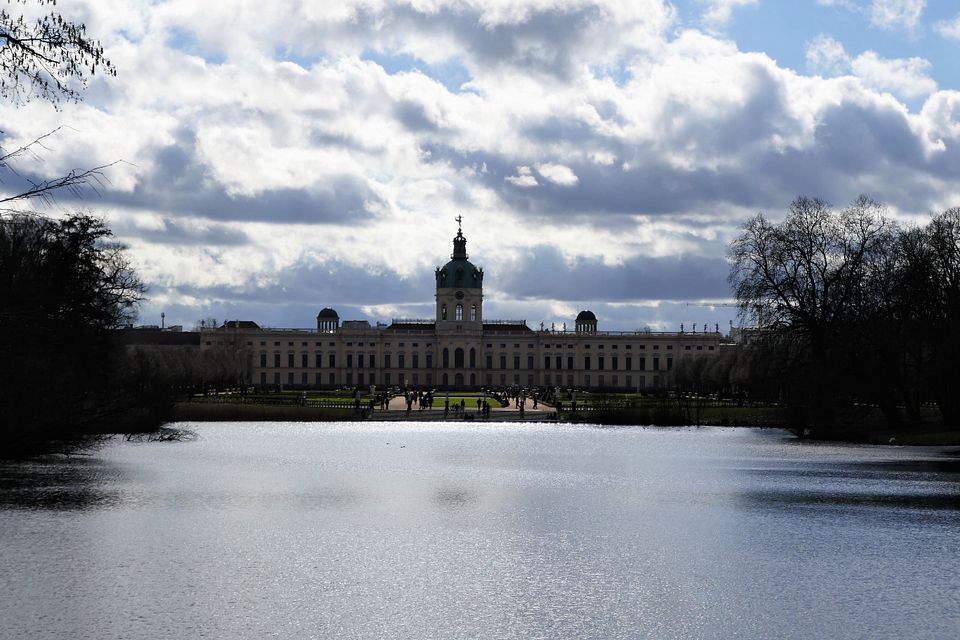
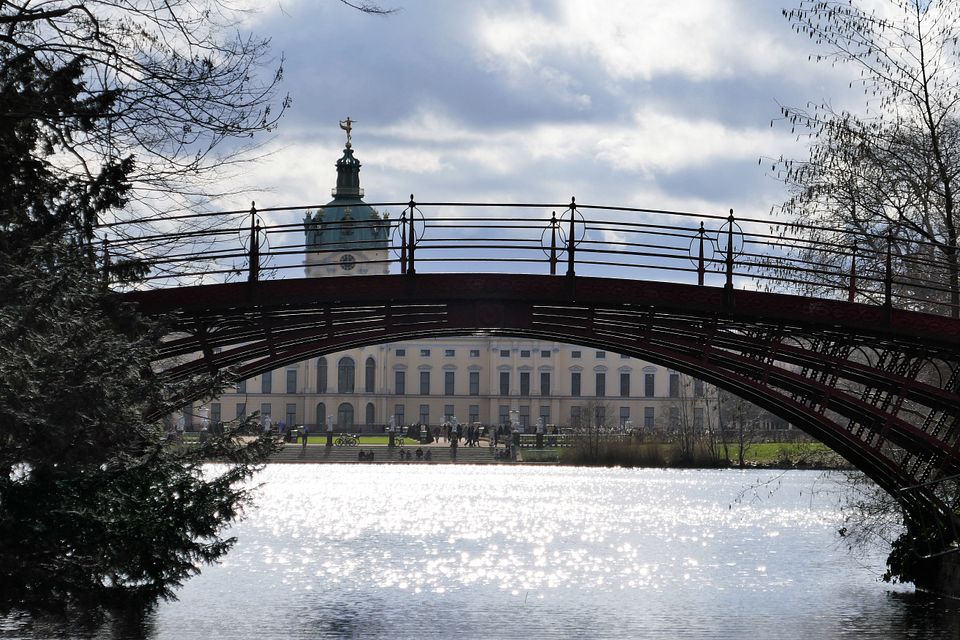

This is the Old Palace, the Altes Schloss, the original core building.


The New Palace, where Fritz and the post Fritz Hohenzollern resided.


The roof where I imagine young Sophie (future Catherine the Great) and Heinrich playing hide and seek:

The park, through which as F1 once wrote touchingly to his mother-in-law, he still wanders looking for his beautiful (dead) queen, her daughter:

It also has the occasional mini palace building, like Belvedere.

But that's closed in winter. So let us enter the old palace. Where F1 wants you to know he so is a King, too, and anthing Louis XIV can do... welll, you get the idea.
This "parade bedroom" was one of the last rooms created in F1's life time, for his third wife, the Mecklenburg princess who went insane and scared him to death.

The darkness is because this room actually made it through the centuries and WWII intact, so they can't put too much light on the decor.

A lot of the paintings on the ceilings are preserved, which you'll later see is not the case in the New Palace.

The Green Antechambre. All the followoing rooms were created for Sophie Charlotte, the Hannover princess who briefly transformed Berlin to an "Athens on the Spree".




The Glassroom. This one had to be reconstructed from scratch based on photographs and descriptions.




We're nearing a main salon, where I found a painting familiar to me from various biographies.

That's right, this dressing room is where Mom hung up the painting of twelve years FW as (the biblical) David. The crazy thing is, if you're familiar with pictures of adult FW, you can actually recognize it's supposed to be him.)






Bedroom.

The ceiling of the small "golden chamber" which was a writing cabinet next to the bedroom:

Naturally, the palace has paintings of the usual suspects, like SC's mother Sophie, she to whom the Hannover cousins will owe their British inheritance.

And here's SC herself, and Leibniz, who divided his time between mother and daughter who both were his patrons.


I had seen this in the F1 biographies but had not yet the chance to share, so here's the original: F1's Tobacco Parliament. Note there is actually a WOMAN participating. (His third wife.)

There are even paintings of G1's Turkish valet whom he took along to Britain and whom he ennobled, Mehmed von Königstreu, and of Eleonore Aly, the wife of SC's Turkish valet Aly whom she had brought from Hannover. (Remember, G1 and SC were siblings.)


And, naturally, of both F1 and SC on the one hand, and FW and SD on the other. (FW closed down most of the royal palaces when he took over, but he did let SD use Charlottenburg every now and then.)


On to F1's rooms, when he was in the palace. (He and SC had an agreement that he had to ask for her permission first.)

Note that there are a lot of combined isignia for F1 and SC, not just their initials but also the animals symbolizing their dynasties - the Prussian Eagle and the Welf Steed (which you should see in some Hannover palacesi n GB as well).

F1's audience room:

The Lower Oval Hall from which SC could go directly into the garden.

There's a small reminder here - and a longer one if you use the audio guide - to a rather infamous event in West German post war history, the 1967 visit of the Shah in Berlin. The grand reception took place here. Meanwhile, the protests outside turned bloody, and the shooting of an (unarmed) student by a police man is widely credited for triggering the German variation of the 1968 youth revolt and the radicalisation of many a student. (There is an additional irony: the cop who shot the student was actually a spy working for the Stasi, the East German secret service, something that only was revealed after his death.)

Back to Baroque affairs. When F1 collected China, HE COLLECTED CHINA. Behold the porcellain room:






But we're not done with the Baroque yet. Now, the next part slew me. I've seen my share of opulent Baroque churches, believe me. But those were CATHOLIC baroque churches, who as part of the Counter Reformation went the extra mile in showing that they're the church with the splendour. F1, let us never forget, wasn't just a Protestant, he was a CALVINIST. And yet, when it came to the chapel (ahem) of Charlottenburg, he commissioned something which would have given good old Jean Calvin apoplexy. Behold:





Leaving the Old Palace behind, let's go to the New Palace, where a visitor experiences the rooms in reverse chronological order.
These rooms were actually being decorated for EC in 1740, which I found interesting, - did someone not get the memo or did Fritz consider living with her nominally and then changed his mind during Silesia 1? - but hardly had they been finished that she had (been) settled in Schönihousen for good, so she only rarely lived there, i.e. if there was a grand celebration she was actually invited to. Later, the rooms were completely refurbished and repurposed to serve as living rooms for FW3 and his Queen, Luise. Given Luise's famous hostility to Napoleon, I have to wonder who had the idea to put all the David paintings there?


Even later in the 19th century, but cool, so I took a picture: a panorama painting from 1832, showing the view from the Friedrichswerder Kirche. That Berlin was gone even before WW3, so it's a glimpse to a lost world, only a century after our main era:


FW2, Fritz' much mocked nephew and successor, Dad to FW3, had both summer and winter rooms in this part of the palace, and they were so very pretty I took a lot of pictures. The plaques informed me his mistress, Wilhelmine Encke, Gräfin Lichtenau, did the shopping and selecting for him. She is described as a"the King's mistress, confidant and advisor" as well as "a woman of style and taste", which would have driven FW3 who hated her and who behaved incredibly petty nuts, but I must admit I felt gleefully satisfied, because yes, going by those rooms, she had plenty of style. (Frederick Hervey, Earl of Bristol, Bishop of Derry: I agree!.)
The summer rooms:




The winter rooms:





Now comes a section which is a Mildred special - MAPS MAPS MAPS! Showing how the Hohenzollern went from medieval robber barons to princes elector to dominating German power.
You know, this lot are the forefathers. From Hechiingen in Swabia, before they went East. This is the "Ahnengalerie", the gallery of forefathers.

Some forefathers, and the territorial aquistions through the centuries, with always the outlines of modern Germany sketched in so you can see where that was by comparison.






And then there was the Empire. Well. We all know how that ended. Except for the current chief Hohenzollern, Georg Friedrich, the one who sued the state of Brandenburg and the Federal Republic because he wanted some cash compensation and experienced major backlash, to put it mildly. He did succeed in getting many a plaque to say "property of HRH Georg Friedrich of Hohenzollern".
First, there's a small Pesne collection. Originally, every grand room had a big ceiling paintinhg by him, but that was burned to ashes. What survived were small paintings meant as studies for later large ones, like the following ones, starting with SD's first baby boy who died as a baby, Friedrich Ludwig. As I said elsewhere, the small black child holding the umbrella appears to be the same (somewhat older then) boy doing just this in the painting of toddler!Wilhelmine and baby!Fritz, so I wonder what became of him - I don't recall any of siblings ever mentioning him.

Then there are paintings of F1's coronation at Königsberg and of August the Strong visiting FW and family in 1728.


And here's Caesarion himself, Keyserling, aka the guy all the envoys thought would be Fritz' almighty favourite in 1740 and who instead was told by Fritz that he was very very fond of him, but did not take him serious at all.

Pesne also did some erotic paintings for himself:

Post Antoine P. room, we're entering the rooms Fritz & Co. lived post 1740. The first one, the Blue Atlas Room, also contains a model of Charlottenburg with a thoughtful map and inscriptions as to which sibling had their wedding, apartment or grand party in which part of the palace:




Yes, that's where Heinrich married poor Mina, to their mutual misery. Lehndorff gave us a detailed description of the festivities in his diaries.
Speaking of Heinrich, there's a copy of his best known old age portrait and one of Amalie's best known portrait in this room:


As mentioned, Charlottenburg was where many a grand ceremony and party took place in the Frederician era. Hence the size of the dining room:

And the ball room, aka the "Golden Gallery":





After the Golden Gallery are the actual living quarters, like the silver room:

The Yellow Atlas Room:


The Gris de lin Chambre:

One of two writing rooms:


Naturally, a music room:



And a library:


With Voltaire volumes, because Fritz literally could not live without them, and he had all libraries in any palace he resided in contain the same books:

Main working study with the type of slanted desk you also see at Sanssouci:


And monogrammed fireplace:

Now, as mentioned the whole palace had so much WW2 damage, but you know what survived? I may have said "are you kidding me?" out loud. What made it through the centuries undamaged is Fritz' porcelain loot from Saxony, Meissen, to be precise.


How to we know this is the very porcelain Fritz brought home from the 7 Years War? It was inventoried. Also he actually commissioned, i.e. ordered the Meissen factory to create avery special set for him: a warrior lounging on the Saxon fleshpots:


Subtle, Fritz. Very subtle.

(BTW, note this statue doesn't have the usual dogs, it has books at his feet instead.) So let's say goodbye to Charlottenburg from the other side of the water:

